North Carolina Documents
Quitclaim Deed
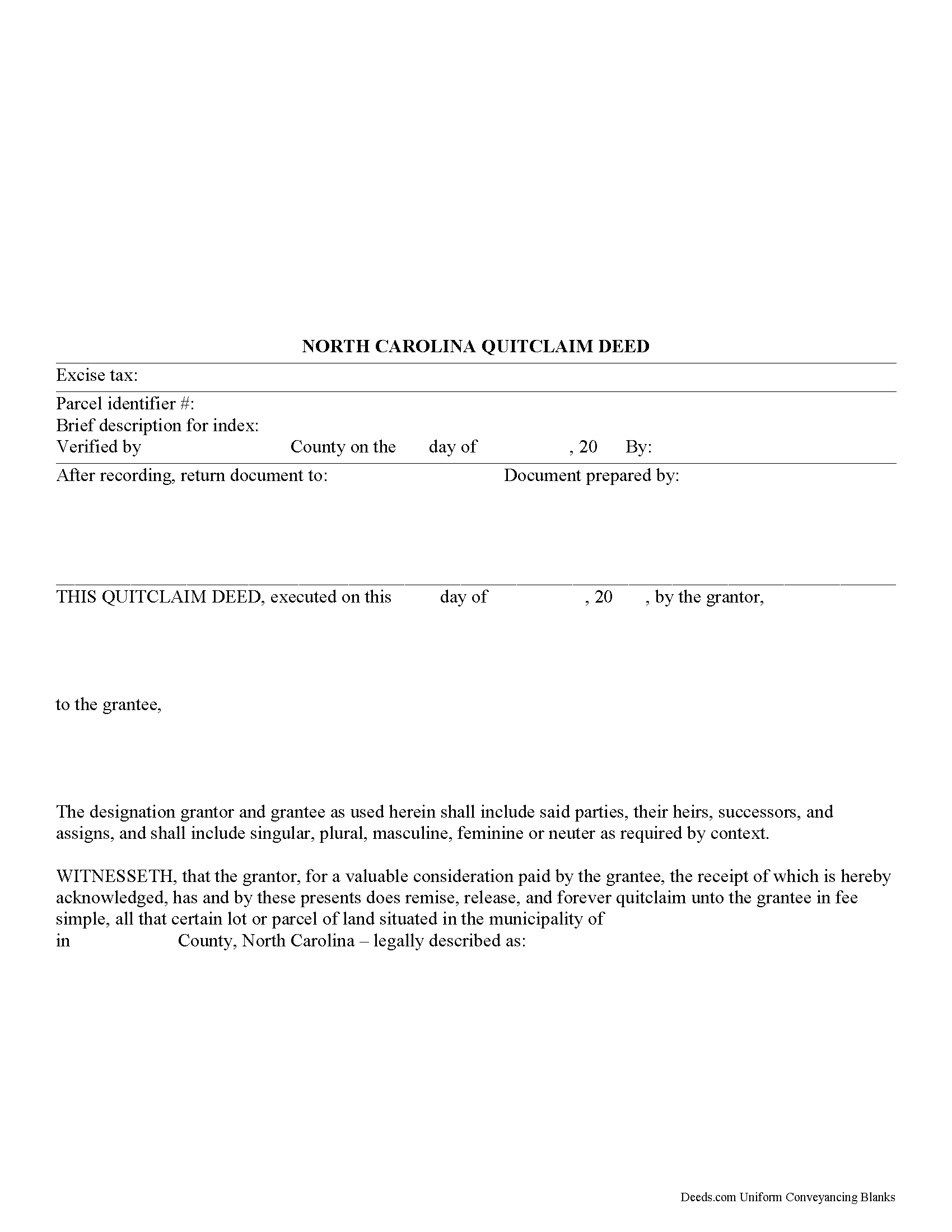
North Carolina --- Quitclaim document requirements and recording act
Both the grantor and grantee are required to sign a quitclaim deed executed in North Carolina. If there is more than one grantor or grantee, a signature from each is required. The grantor's signature must be acknowledged in accordance with the North Carolina notarial acts (47-38) Non-warranty deeds and quitclaim deeds do not need to show a source of title in order to record. Specific requirements must be met when registering a quitclaim deed. Quitclaim deeds are sometimes referred to as non-warranty deeds in this state.
A quitclaim deed is not valid against lien creditors or purchasers for a valuable consideration until it is registered with the Register of Deeds in the appropriate county in North Carolina. The priority of recorded documents is based on the order of registration, unless it is stated otherwise on the registered quitclaim deed or on a separate registered instrument that is duly executed by the party whose priority interest is adversely affected. If instruments are registered simultaneously, the earliest document number or the sequential book and page number listed on the document will establis... More Information about the North Carolina Quitclaim Deed
Gift Deed
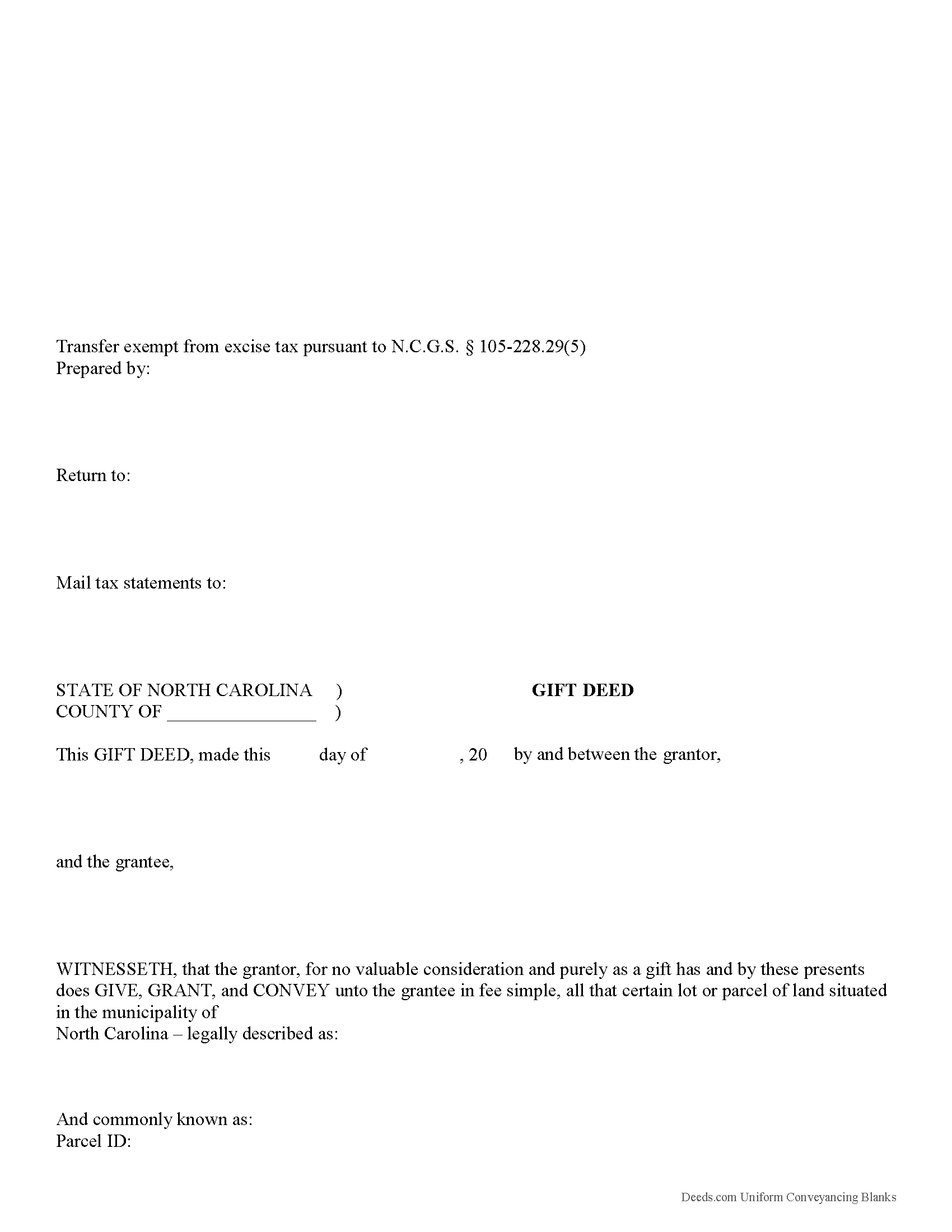
Gifts of Real Property in North Carolina
A gift deed, or deed of gift, is a legal document voluntarily transferring title to real property from one party (the grantor or donor) to another (the grantee or donee). A gift deed typically transfers real property between family or close friends. Gift deeds are also used to donate to a non-profit organization or charity. The deed serves as proof that the transfer is indeed a gift and without consideration (any conditions or form of compensation).
Valid deeds must meet the following requirements: The grantor must intend to make a present gift of the property, the grantor must deliver the property to the grantee, and the grantee must accept the gift. Gift Deeds must contain language that explicitly states no consideration is expected or required, because any ambiguity or reference to consideration can make the deed contestable in court. A promise to transfer ownership in the future is not a gift, and any deed that does not immediately transfer the interest in the property, or meet any of the aforementioned requirements, can be revoked [1]. In North Carolina, a Gift Deed must be recorded to be considered valid. The deed must be proved... More Information about the North Carolina Gift Deed
Warranty Deed
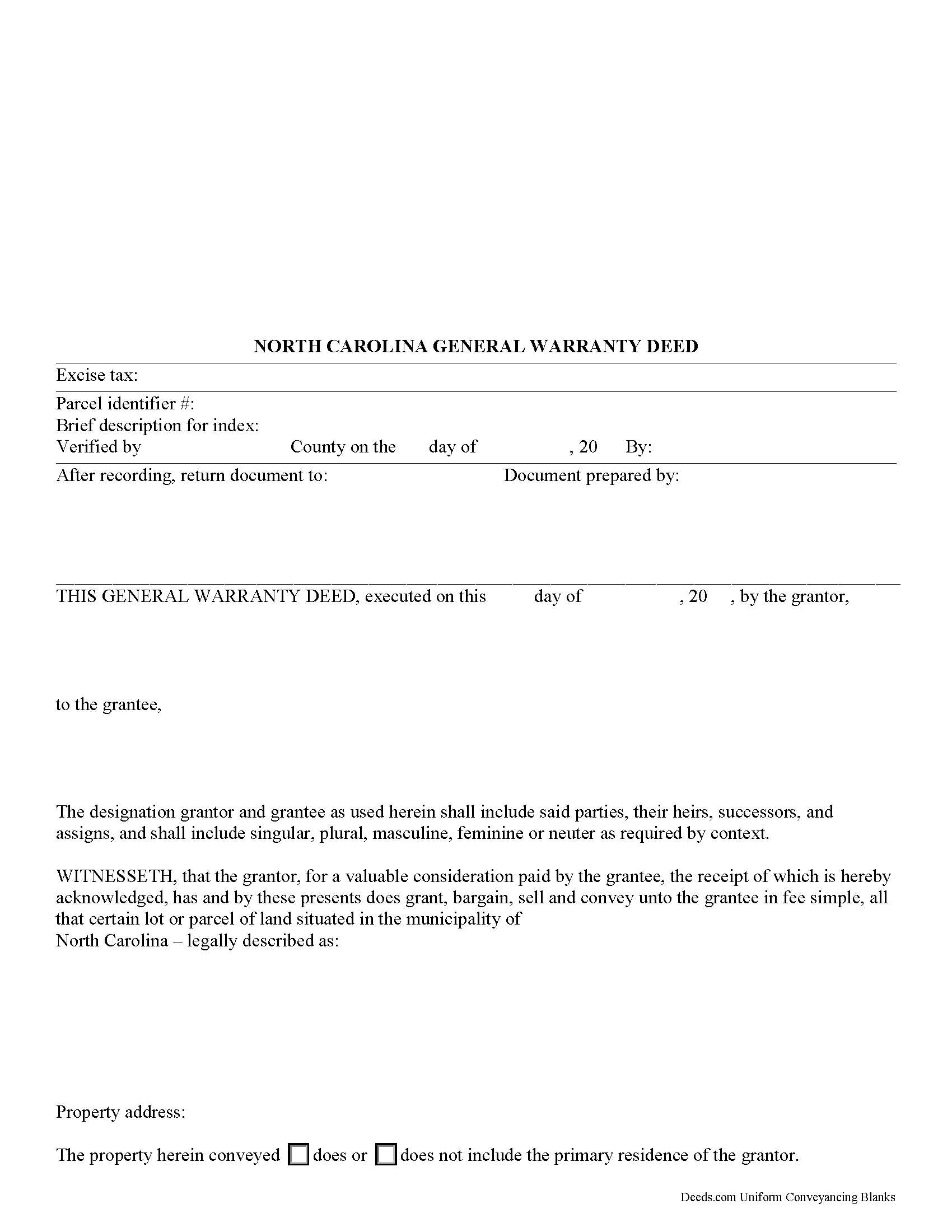
A warranty deed is a common real estate deed in North Carolina used to transfer title to real property. A typical warranty deed contains covenants of seisin, right to convey, marketability of title, freedom from encumbrances, and covenants of warranty from the grantor to the grantee. The North Carolina General Statutes do not provide a statutory form for real estate deeds.
In order to be recorded in North Carolina, a warranty deed must be signed and properly acknowledged by the grantor before an officer authorized by the state to take acknowledgments of deeds. An individual form for acknowledgment by a grantor is presented in 47 38 of the North Carolina Statutes. If a document has been executed and acknowledged in a state other than North Carolina, the deed must conform to North Carolina law in order to be recorded. Documents must be executed and acknowledged in strict compliance with the North Carolina acknowledgment provisions in order to be recorded and to provide constructive notice.
No conveyance of land in North Carolina will be valid to pass any property interest as against lien creditors or purchasers for a valuable consideration from the donor, bargainer, or lesse... More Information about the North Carolina Warranty Deed
Special Warranty Deed
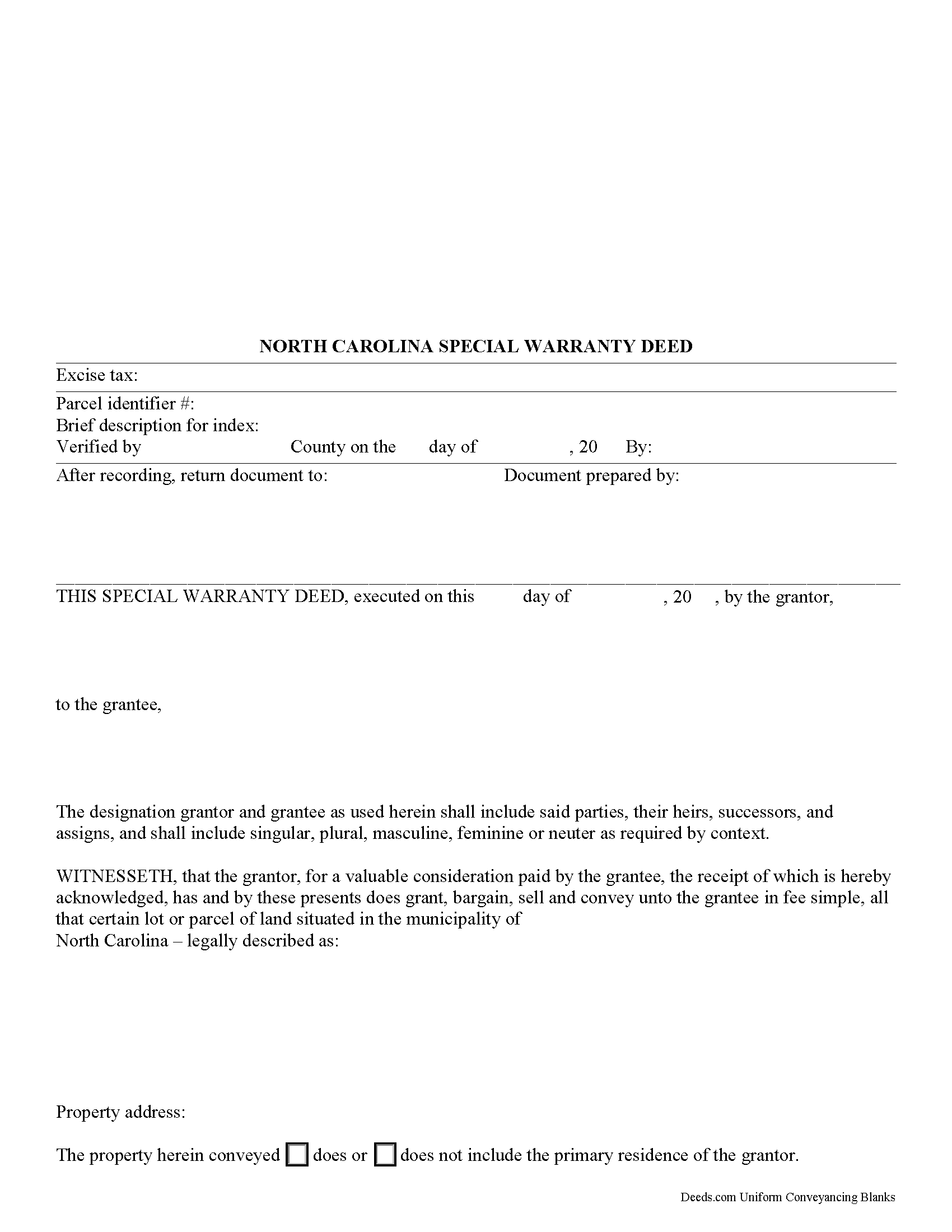
Real property can be transferred in North Carolina by using a special warranty deed. This type of deed does not have the same warranties of title contained in a general warranty deed. The North Carolina General Statutes do not offer a statutory form for real estate deeds. The grantor in a special warranty deed offers the following covenants to the grantee: (1) that the grantor has done nothing to encumber the title, and (2) that the grantor will warrant and defend such title against the lawful claims of all persons claiming by, through, or under the grantor.
North Carolina requires strict compliance with the statutory acknowledgment provisions in order for documents to be recorded and to provide constructive notice. Before it can be accepted for recording by a register of deeds, a special warranty deed must be signed by the grantor and properly acknowledged before an officer authorized by the state of North Carolina to take acknowledgments of deeds. The individual form for an acknowledgment by a grantor in 47 38 of the North Carolina General Statutes is sufficient to use for a special warranty deed acknowledged within the state. If a special warranty deed has been executed and ... More Information about the North Carolina Special Warranty Deed
Grant Deed
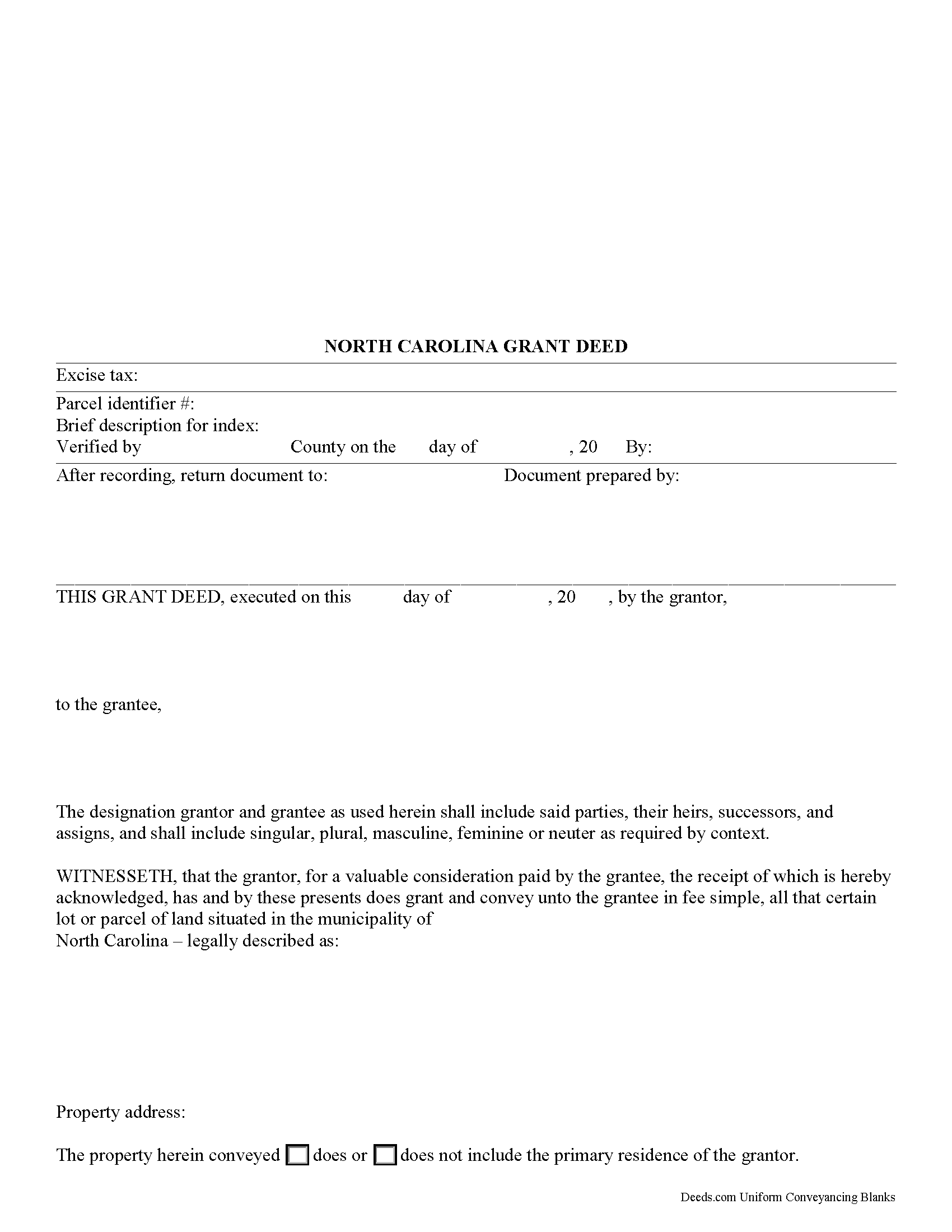
A grant deed can be used in North Carolina to transfer title to real property. This type of deed falls between a warranty deed and a quitclaim deed.
In a grant deed, the seller (grantor) warrants that the property is free from any encumbrances except those that have been previously disclosed to the buyer (grantee). The seller also guarantees that he does in fact hold title to the property and has the right to convey it to the buyer.
A grant deed must be signed and properly acknowledged by the grantor before an officer authorized by the state to take acknowledgments of deeds. Section 47-38 of the North Carolina General Statutes provides an individual form for acknowledgement by a grantor. If a deed has been executed and acknowledged in a state other than North Carolina, the deed must conform to North Carolina law in order to be recorded in this state. Grant deeds must be executed and acknowledged in strict compliance with the North Carolina acknowledgment provisions in order to be recorded and to provide constructive notice.
North Carolina has a pure race recording statute. No conveyance of land in this state will be valid to pass any property interest as against lien cre... More Information about the North Carolina Grant Deed
Correction Deed
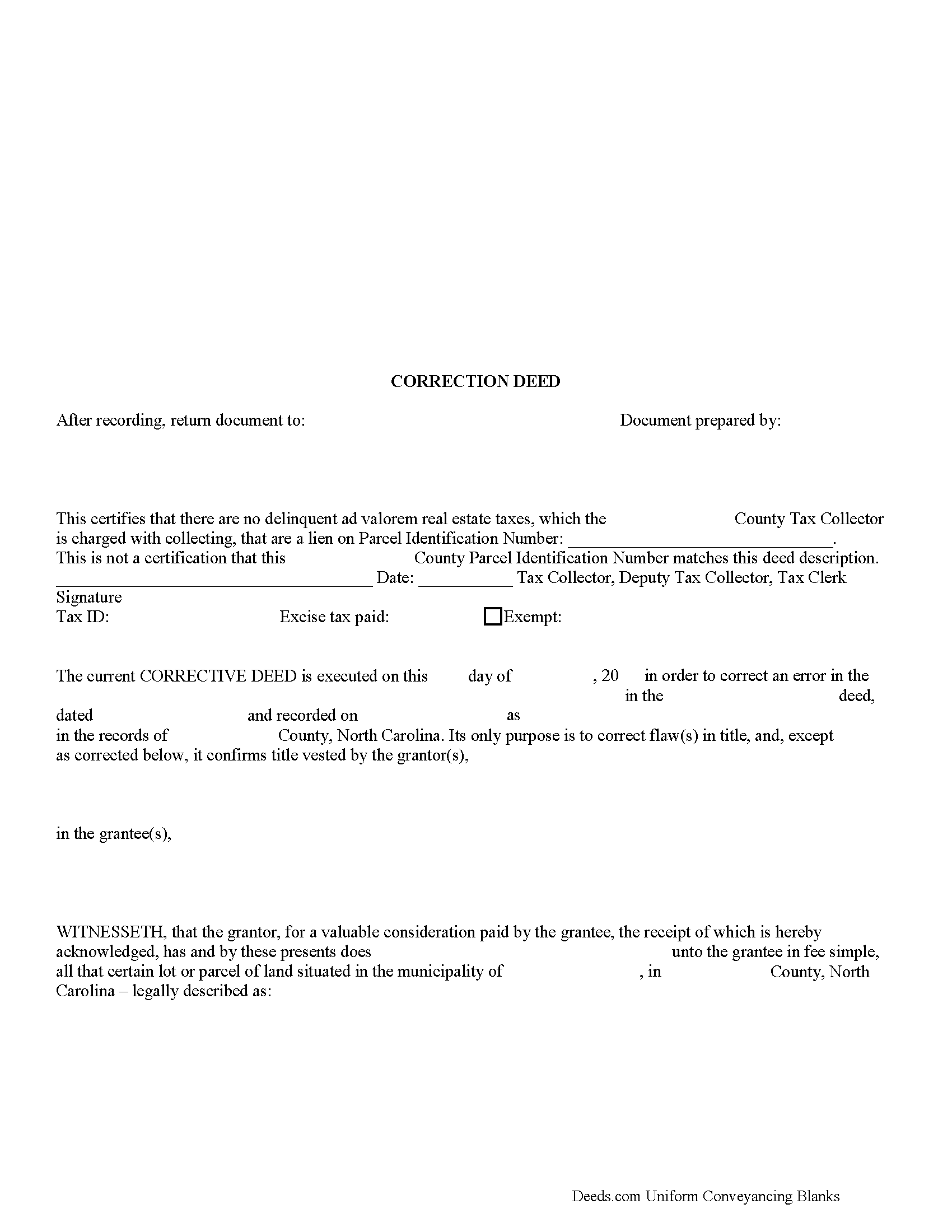
Use the correction deed to correct errors in a warranty, special warranty, or quit claim deed in North Carolina.
In North Carolina, several correction options may be used: an affidavit of correction, also called scrivener's affidavit; a re-recording of the original erroneous deed; and a newly drafted correction deed. Choosing the best option will depend on the type of error in the deed. Minor or typographical errors can be addressed through the affidavit (N.C.G.S. 47-36.1), but material errors and any errors affecting the legal description require a correction deed, or at least a re-recordation of the corrected original deed.
The affidavit of correction goes on public record with cross-reference to the deed and constitutes notification of an error, but not an actual correction. When re-recording the original deed, make corrections directly on the document (or a certified copy of it). Initial these changes and have the document re-signed by the original parties and re-acknowledged. Check with the county's recording office before choosing this option to verify local requirements regarding title pages, contents and fees.
The easiest and cleanest option for correcting a dee... More Information about the North Carolina Correction Deed
Beneficiary and Executor Deed
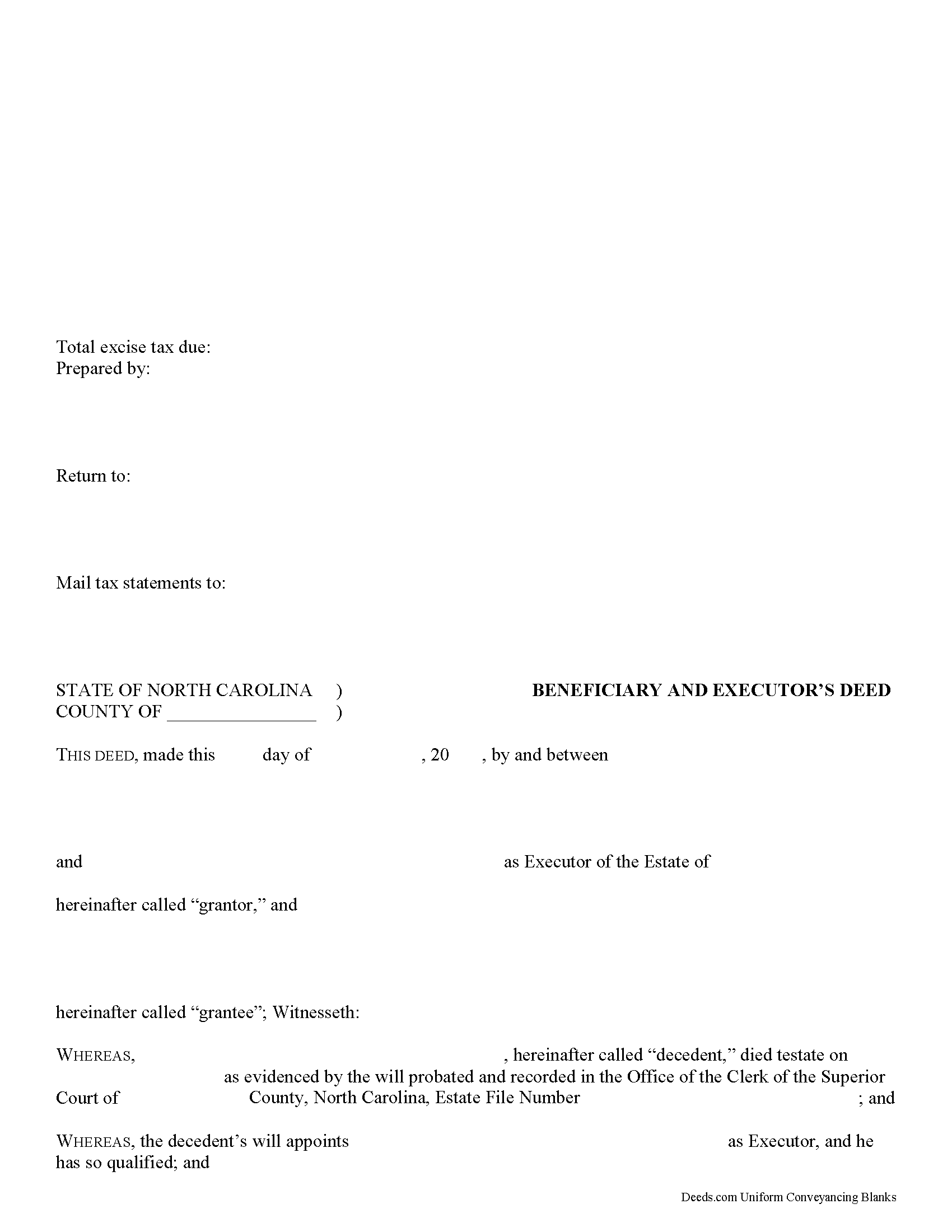
Probate is the legal process of proving a decedent's (deceased person's) will, if any, valid and settling his or her estate. An executor is the personal representative named in the decedent's will to administer his or her estate.
When the estate's assets are not sufficient to pay debts, the executor may need to petition the superior court where the estate is open to obtain an order to sell the decedent's real property. In North Carolina, title to real property vests in the decedent's heirs upon death, and a special proceeding is required to bring the property into the estate.
The beneficiary and executor's deed is an instrument executed by a decedent's heirs and joined by the executor of the decedent's will to convey an interest in real property from a testate estate (so called when the decedent leaves a will) to a purchaser.
When the estate is still open in probate, the executor joins in the deed consenting to the sale of the real property described within as required by N.C.G.S. 28A-17-12. By signing the deed, the executor waives the possibility of opening a special proceeding to bring the property back into the estate later.
Unless a) the decedent wills the realty... More Information about the North Carolina Beneficiary and Executor Deed
Executor Deed
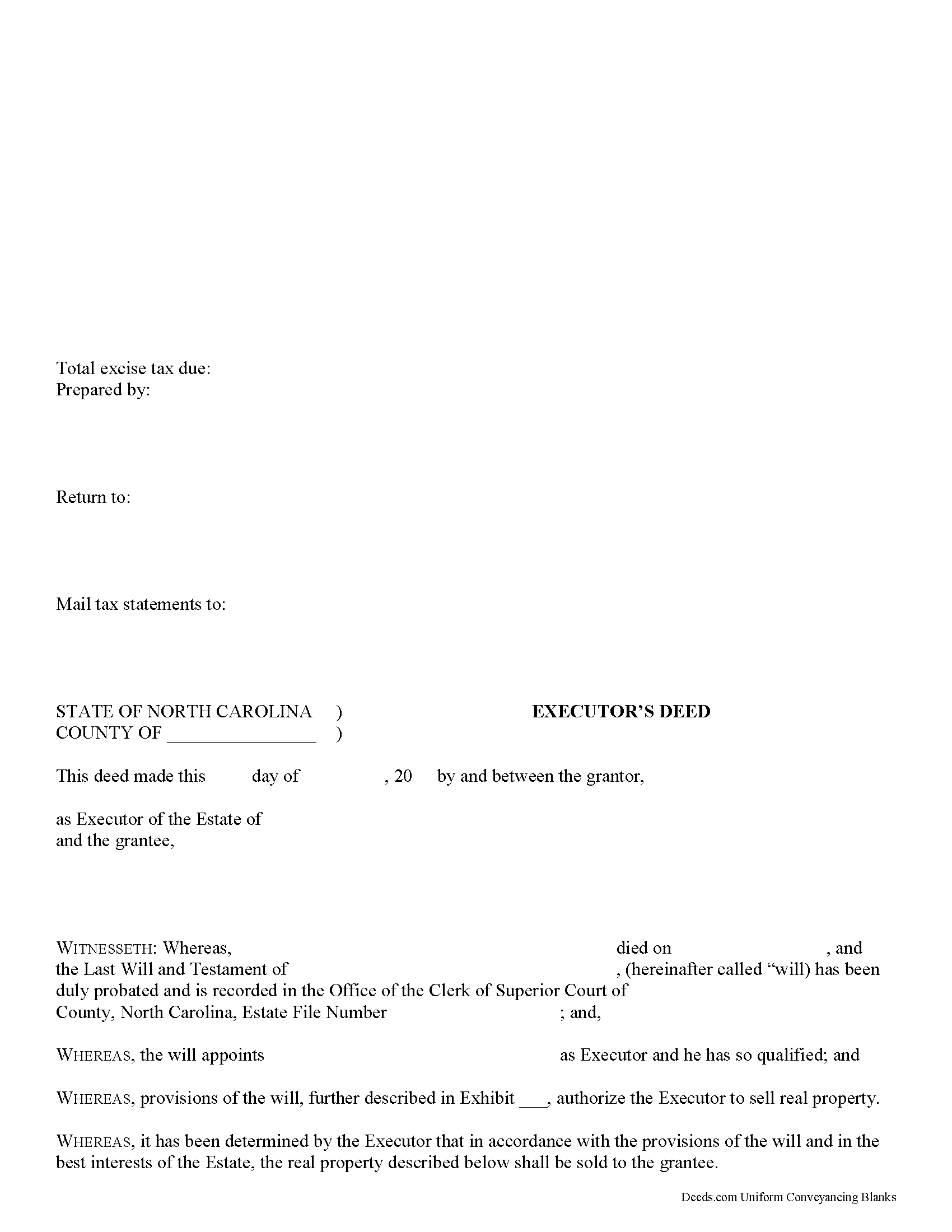
Probate is the legal process of proving a decedent's (deceased person's) will, if any, valid and settling his or her estate. An executor is the personal representative named in the decedent's will to administer his or her estate.
When the estate's assets are not sufficient to pay debts, the executor may need to sell the decedent's real property. In North Carolina, title to real property vests in the decedent's heirs upon death, and a special proceeding is typically required to bring the property into the estate.
Under N.C.G.S. 28A-15-1(c), a special proceeding before the clerk of superior court is not required for a sale by a personal representative made pursuant to authority given by a will, which permission may include a general provision granting authority to the personal representative to sell the testator's real property, or incorporation by reference of the provisions of N.C.G.S. 32-27(2).
An executor's deed is an instrument executed by the executor of the decedent's will to convey an interest in real property from a testate estate (so called when the decedent leaves a will) to a purchaser. Personal representatives' deeds typically carry limited warranties of tit... More Information about the North Carolina Executor Deed
Beneficiary and Administrator Deed
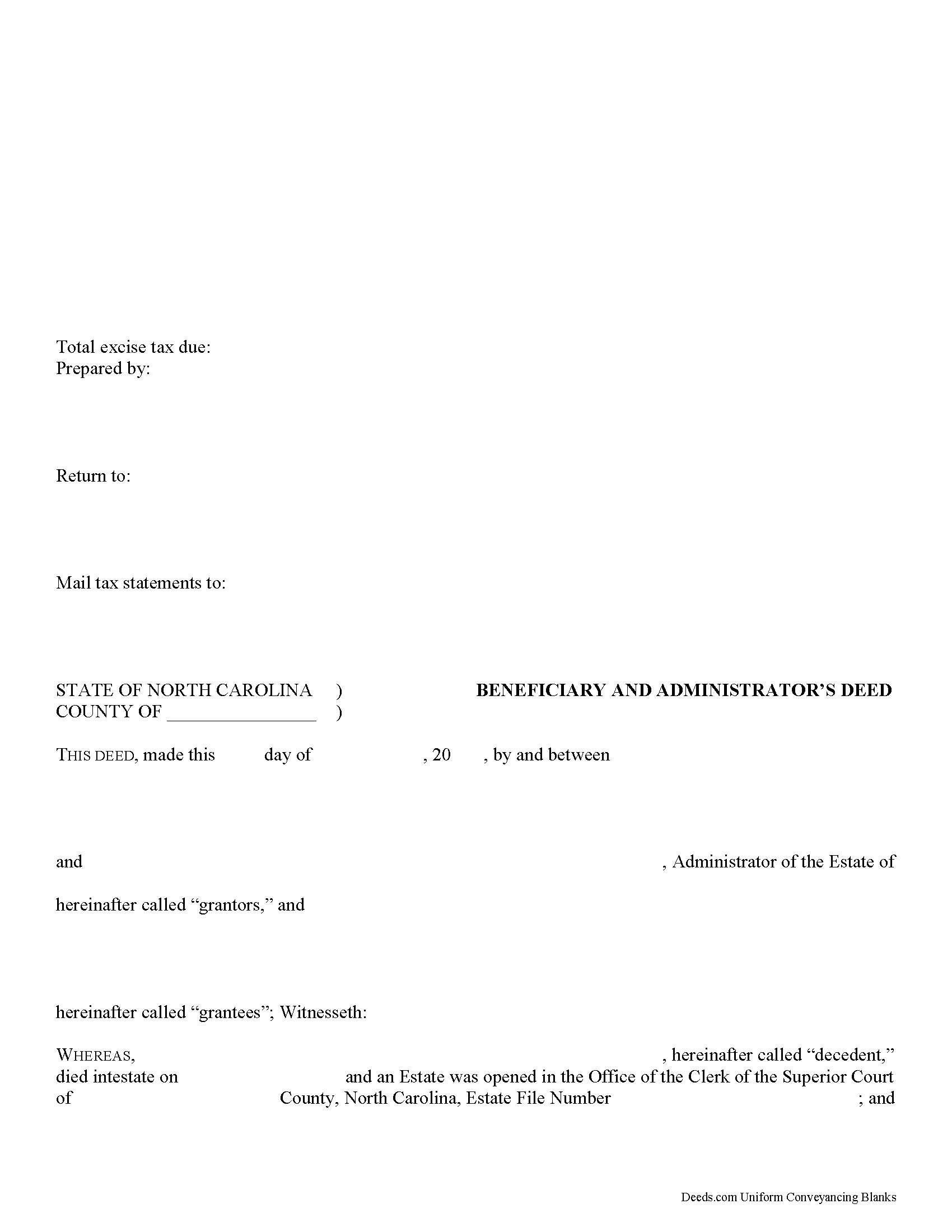
Probate is the legal process of settling a decedent's (deceased person's) estate. An administrator is the personal representative appointed by the clerk of superior court to administer a decedent's estate.
When the estate's assets are not sufficient to pay debts, the administrator may need to petition the superior court where the estate is open to obtain an order to sell the decedent's real property. In North Carolina, title to real property vests in the decedent's heirs upon death, and a special proceeding is required to bring the property into the estate. An administrator may not sell realty without the court's permission.
The beneficiary and administrator's deed is an instrument executed by a decedent's heirs and joined by the administrator of the estate to convey an interest in real property from an intestate estate (so called when the decedent dies without a will, or does not name an executor of the estate) to a purchaser.
When the estate is still open in probate, the administrator joins in the deed consenting to the sale of the real property described within as required by N.C.G.S. 28A-17-12. By signing the deed, the administrator waives the possibility of opening ... More Information about the North Carolina Beneficiary and Administrator Deed
Durable Power of Attorney
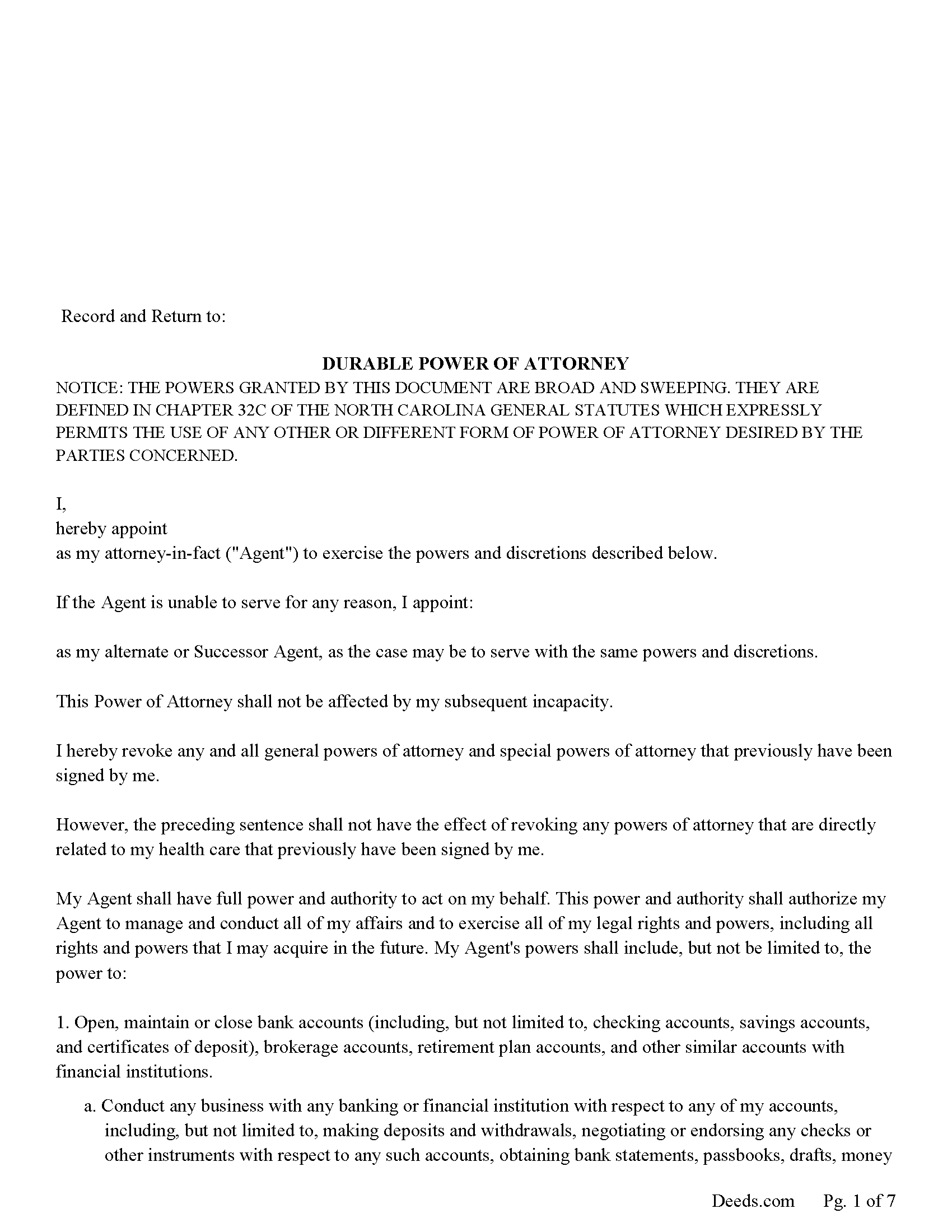
The powers granted to the agent are broad and sweeping, defined in Chapter 32 of the North Carolina Power of Attorney Act, that became effective January 1, 2018.
This POA is effective immediately and is a Durable Power of Attorney, (the incapacity of the principal does not terminate the power of attorney.) A predetermined termination date can be set into this document and/or may be revoked by the principle at any time by providing written notice to the Agent. 32C-1-102 (2)
This POA includes a Substitute Agent in the case the Agent can't or won't act.
1. (The successor agent has the same authority as that granted to the original agent.
2. The successor agent may not act until all predecessor agents have resigned, died, become incapacitated, are no longer qualified to serve, or have declined to serve.) 32C-1-111 (b)
In general, a NC Power of Attorney is NOT required to be recorded unless a real property transfer or a business transaction occurs on behalf of the incapacitate principle. Although recording may not be required it is considered prudent. This form is formatted to meet N.C. recording standards.
(North Carolina DPOA Package includes form, guidelines, and ... More Information about the North Carolina Durable Power of Attorney
Limited Power Of Attorney For Real Property

Limited Power Of Attorney For Real Property Specific Real Property Transaction (N.C.G.S. 32C-3-303)
This is a recordable form used for a real property transaction. It allows the agent to perform one of four tasks on behalf of the principal.
1.To finance the purchase of a property secured by a deed of trust encumbering the property, or
2. To refinance the property secured by a deed of trust encumbering the Property, or
3. To purchase a property in compliance with the terms and provisions of a certain offer to purchase and contract, when Principal is buyer, or
4. To sell a property in compliance with the terms and provisions of a certain offer to purchase and contract, when Principal is seller.
This limited power of attorney becomes effectively immediately and can have a set termination date. If a date is not provided, it terminates in one year.
(North Carolina LPOA Package includes form, guidelines, and completed example)
... More Information about the North Carolina Limited Power Of Attorney For Real Property
Easement Deed
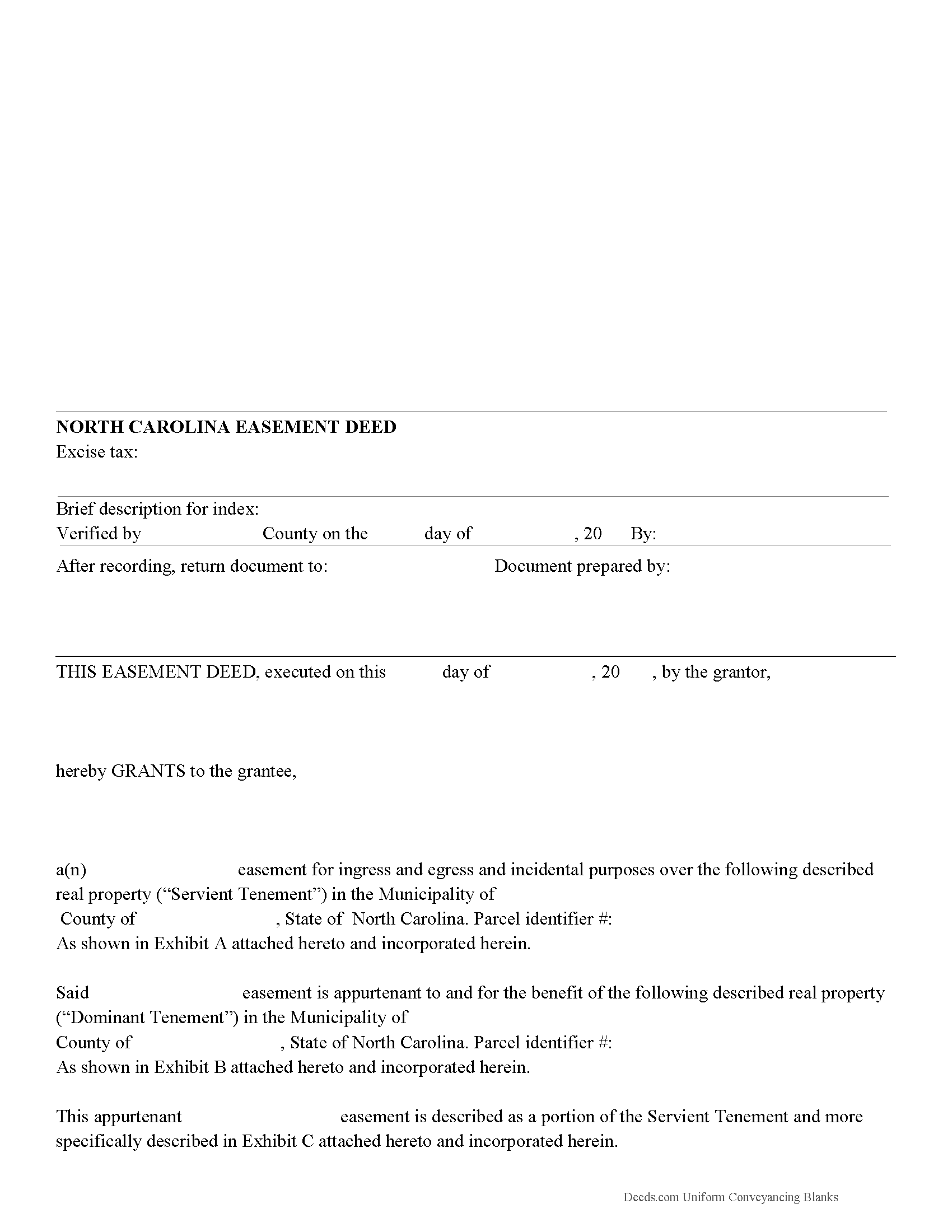
An easement is the right to use another person's real property for a specific purpose. This is a non-possessory interest in property, and can be either appurtenant or in gross. In North Carolina, the holder of a legal or equitable title of an interest in real property can create, grant, reserve, or declare valid easements, restrictions, or conditions of record burdening or benefiting the same interest in real property ( 39 6.4).
All real property documents in this state must be executed and acknowledged in strict compliance with the acknowledgment provisions in North Carolina in order to be recorded and to provide constructive notice. An easement deed must be signed and acknowledged by the grantor. An individual form for acknowledgment by a grantor is presented in 47 38 of the North Carolina Statutes. Acknowledgments must be taken before an officer who is authorized by the state to take acknowledgments of deeds. Documents that are executed and acknowledged out-of-state can be recorded in this state, but they must conform to North Carolina law.
A person who owns or acquires any deed or agreement for rights of way and easements of any character shall record such deeds in the ... More Information about the North Carolina Easement Deed
Termination of Easement
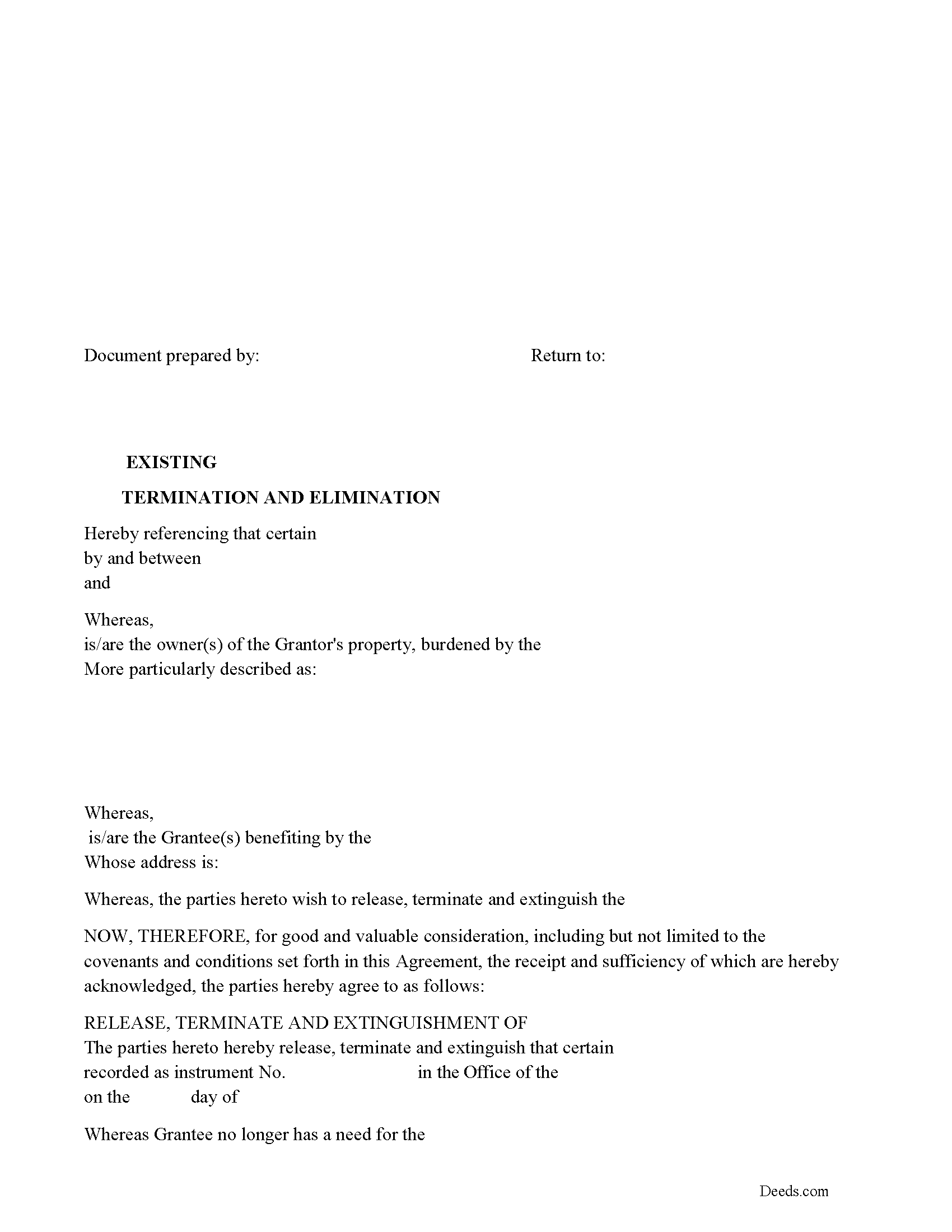
Use this form to release, terminate, extinguish a previously recorded document that involves access to and from a property.
Documents such as:
1. Easement Deeds or Agreements (An easement is a non-possessory interest in land, granting the right to use someone else's property for a specific purpose, like a driveway or utility line)
2. Access Roads
3. Right of Ways
4. Utility Easements (Power, Gas, Water, Sewer, Etc.)
5. Drainage Easements
This document allows the owner of the land, burdened by the access and the party that benefits from the access, to sign an agreement releasing the property from such access, ... More Information about the North Carolina Termination of Easement
Mineral Deed
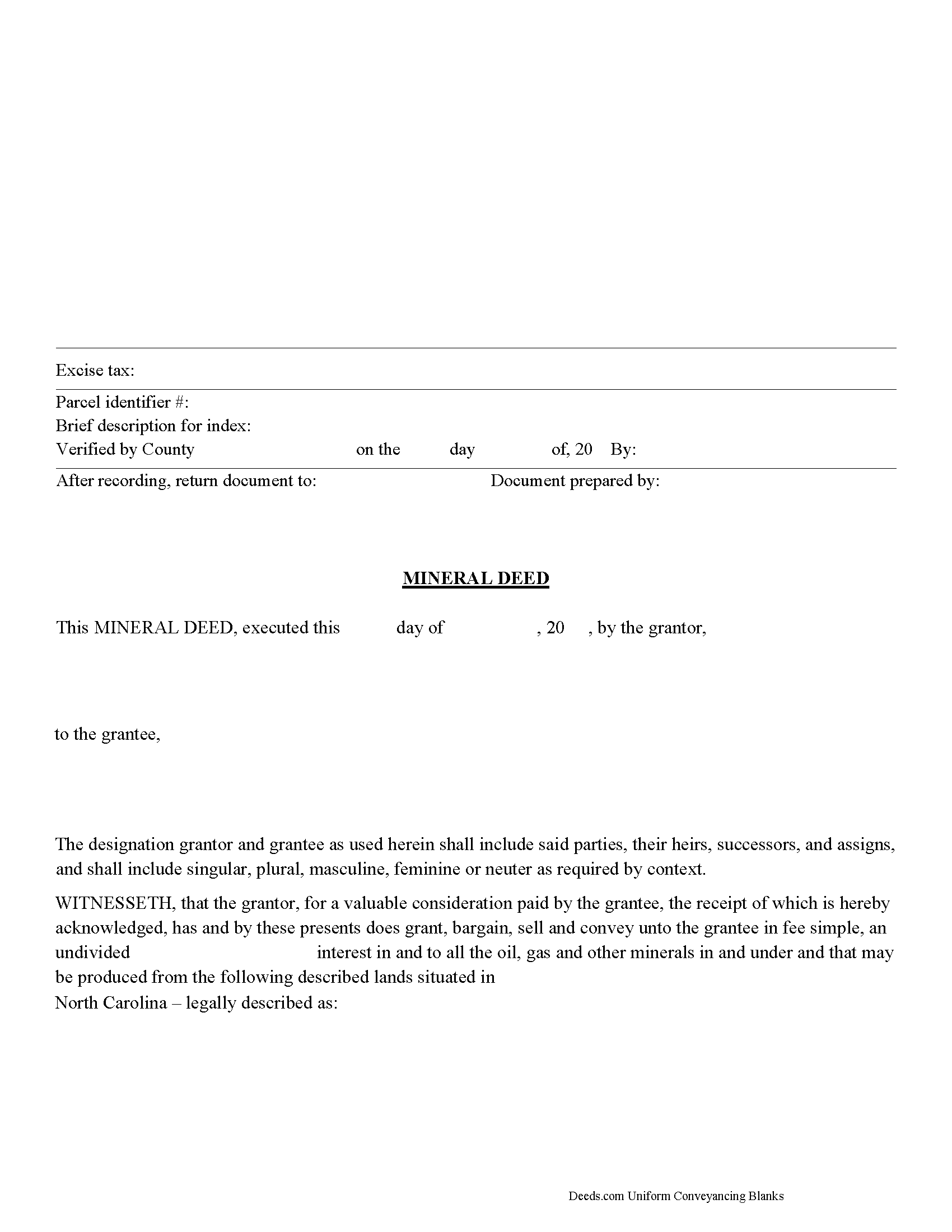
The General Mineral Deed in North Carolina transfers oil, gas, and mineral rights from the grantor to the grantee. THIS IS NOT A LEASE. There are no Exceptions or Reservations included.
The transfer includes the oil, gas and other minerals of every kind and nature. It also transfers any and all rights to receive royalties, overriding royalties, net profits interests or other payments out of or with respect to those oil, gas and other minerals. The Grantor can stipulate the percentage of Mineral Rights the Grantee will receive and is made subject to any rights existing under any valid and subsisting oil and gas lease or leases of record.
This general mineral deed gives the grantee the right to access, for the purpose of mining, drilling, exploring, operating and developing said lands for oil, gas, and other minerals, and storing handling, transporting and marketing of such.
In this document the Grantor Warrants and will defend said Title to Grantee. Use of this document has a permanent effect on your rights to the property, if you are not completely sure of what you are executing seek the advice of a legal professional.
(Mineral Deed Package includes form, guidelines, an... More Information about the North Carolina Mineral Deed
Quitclaim Mineral Deed
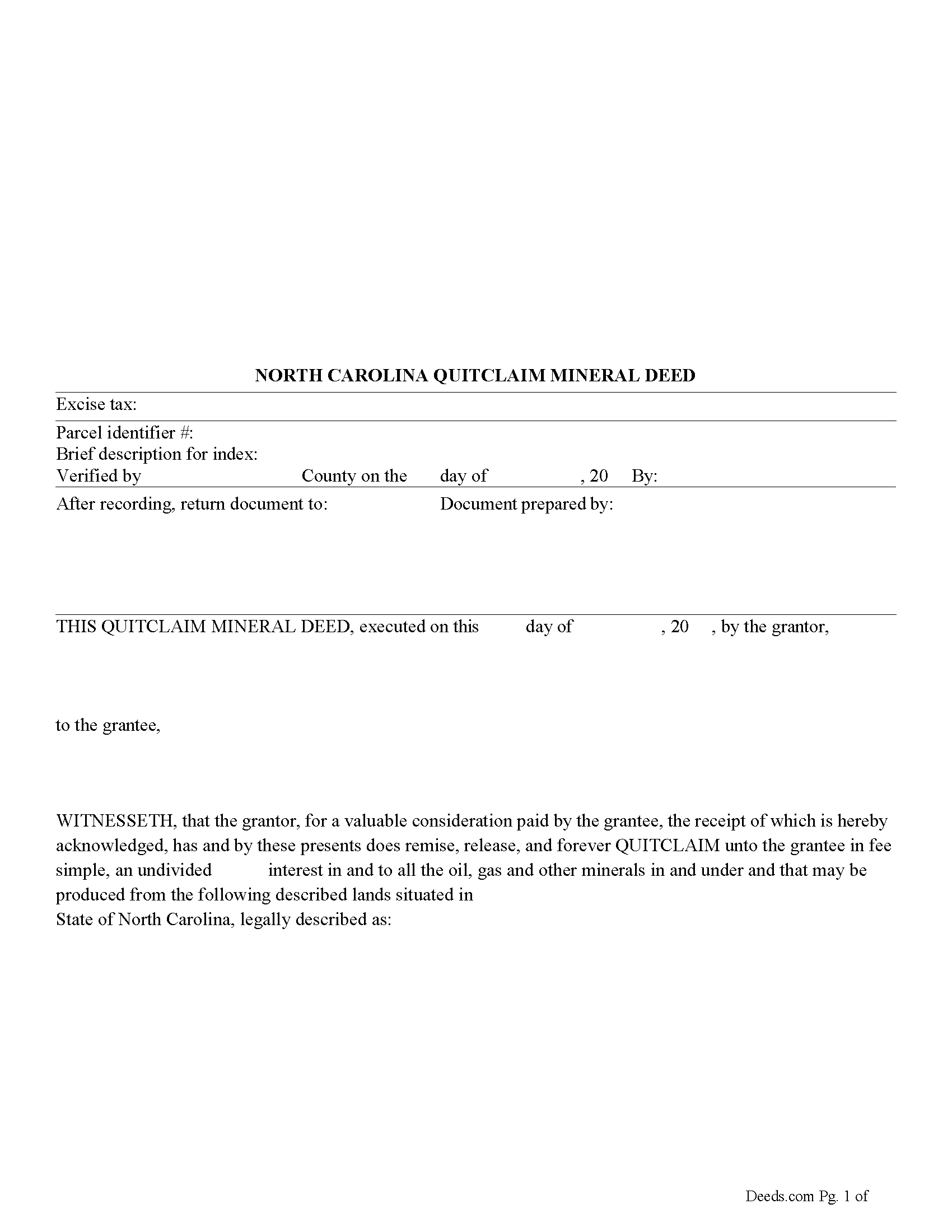
The General Mineral Deed in North Carolina Quitclaims oil, gas, and mineral rights from the grantor to the grantee. THIS IS NOT A LEASE. There are no Exceptions or Reservations included.
The transfer includes the oil, gas and other minerals of every kind and nature. The Grantor can stipulate the percentage of Mineral Rights the Grantee will receive.
This general mineral deed gives the grantee the right to access, for the purpose of mining, drilling, exploring, operating and developing said lands for oil, gas, and other minerals, and storing handling, transporting and marketing of such.
The seller, or grantor Quitclaims the mineral rights and does NOT accept responsibility to any discrepancy of title (This assignment is without warranty of title, either express or implied)
Uses: Mineral deeds with quitclaim are often used in situations where the grantor wants to quickly release any interest they might have in mineral rights, such as in settling estates, resolving disputes, clearing up uncertainties about ownership in a title's history or when mineral rights have previously been severed or fragmented from surface rights and cloud a title, making it difficult to transfer p... More Information about the North Carolina Quitclaim Mineral Deed
Notice to Lien Agent
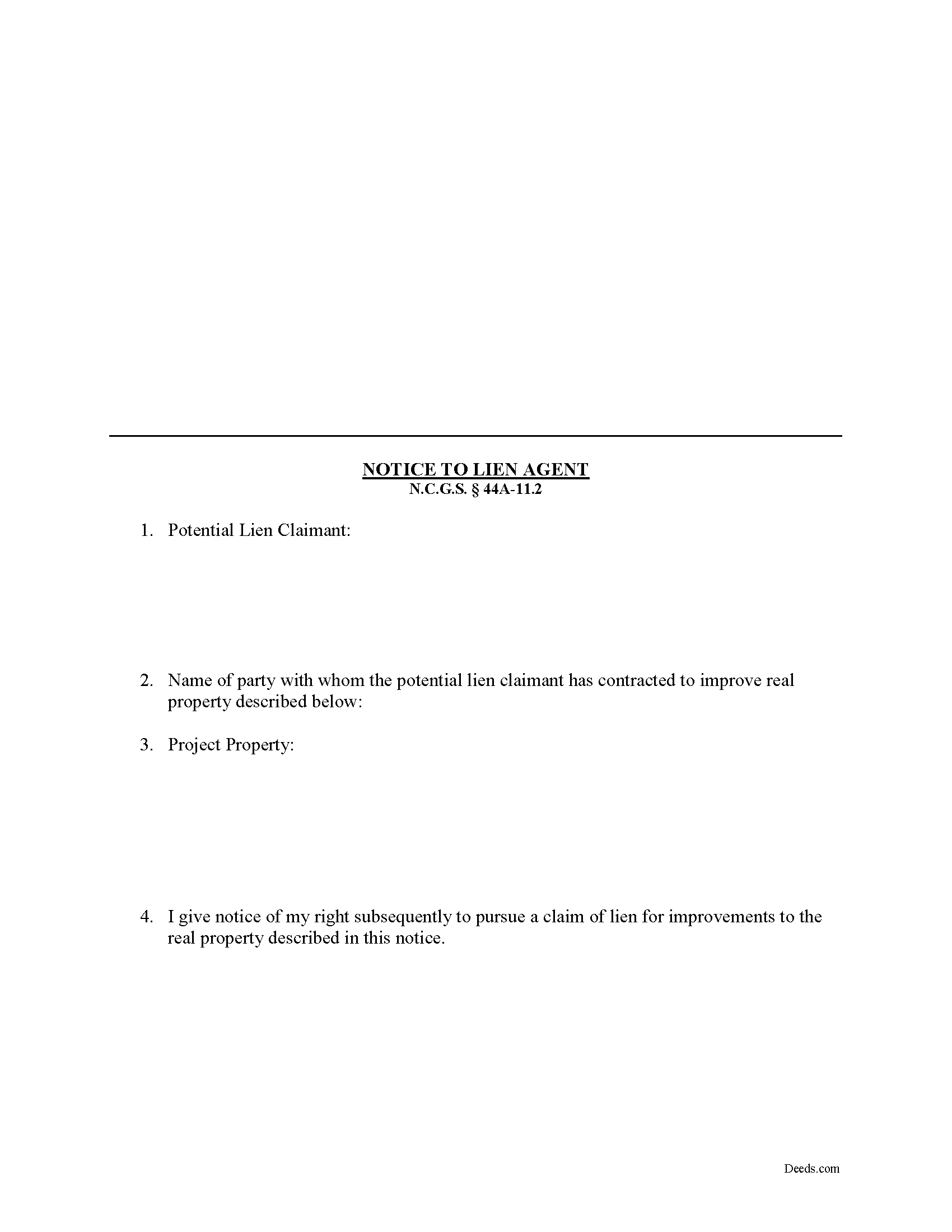
North Carolina Preliminary Notice -- Notice to Lien Agent
North Carolina, like most states, requires a form of preliminary notice to be sent to property owners or other contractors in the chain as an essential step to claiming a mechanic's lien. In North Carolina, the notice takes the form of a "Notice to Lien Agent." A lien agent (usually a title company) must be designated by statute for all non-owner occupied projects exceeding a value of $30,000. N.C.G.S. 44A-11.1. The Notice serves the purpose of providing Lien Agent with notice that the potential lien claimant is or will be providing labor, services or materials to the project property that could be the subject of a later lien claim.
The Notice to Lien Agent must include: 1) the potential lien claimant's name, address, telephone number, fax number (if available), and email address (if available); 2) the name of the party with whom the potential lien claimant contracted; 3) a description of the real property sufficient to identify it; and 4) a statement giving notice of the potential lien claimant's right to subsequently pursue a claim of lien for the improvements to the property. N.C.G.S. 44A-11.2(i).
The Notice to... More Information about the North Carolina Notice to Lien Agent
Notice of Contract
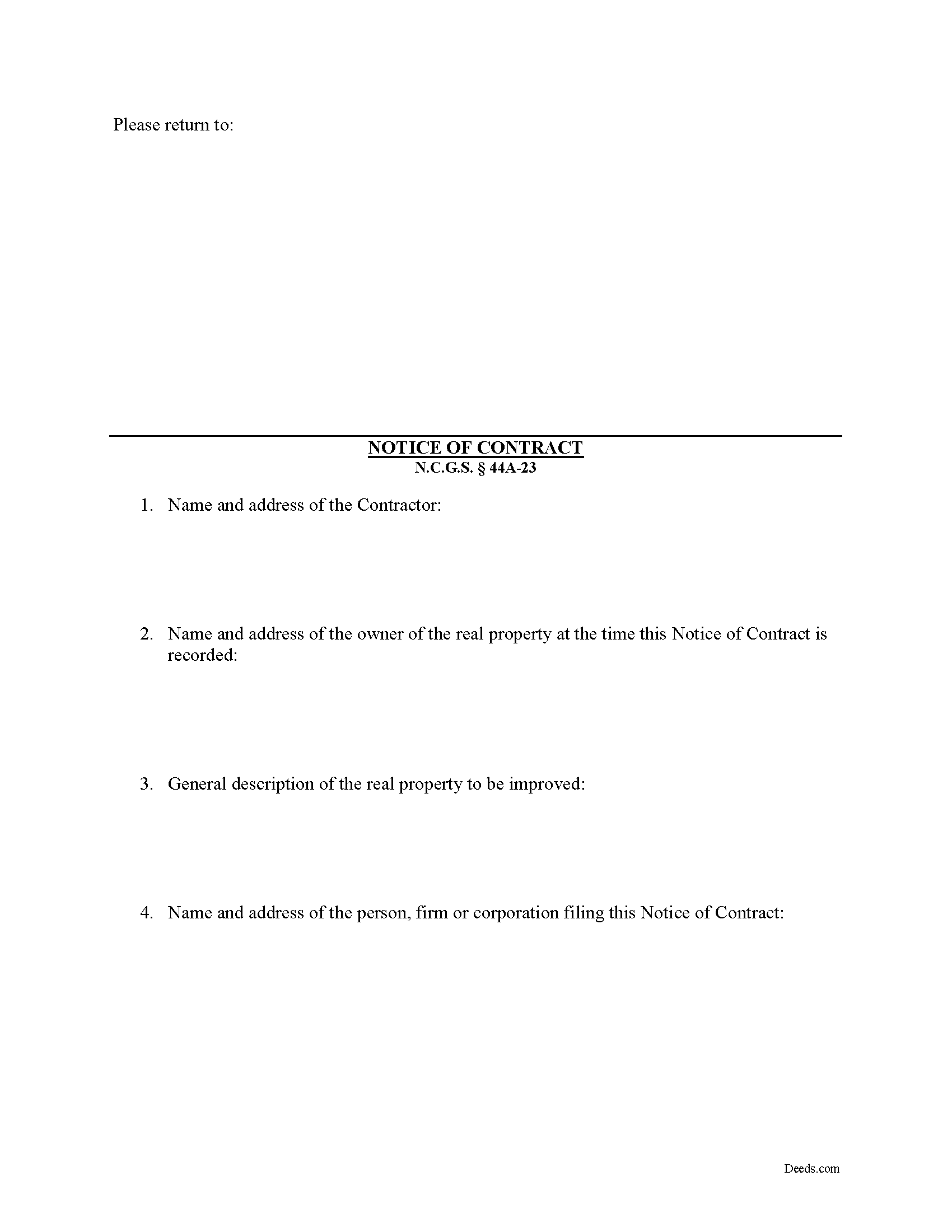
A Notice of Contract is not mandated by the North Carolina lien code, although a prime contractor may want to file and post a Notice of Contract because it offers additional protection by reducing the possibility of double payment. The Notice must be filed and posted within 30 days from the issuance of the building permit. N.C.G.S. 44A-23.
A second or third tier subcontractor will be prohibited from enforcing a lien when a contractor when the Notice is posted on the property and filed with the Clerk of the Superior Court.
The Notice includes: (1) the name and address of the contractor; (2) the name and address of the owner of the real property at the time the Notice of Contract is recorded; (3) a general description of the real property to be improved (such as street address, tax map lot and block number, reference to recorded instrument, or any other description that reasonably identifies the real property); and (4) the name and address of the person, firm or corporation filing this Notice of Contract. N.C.G.S. 44A-23(b)(2).
This article us provided for informational purposes only and should not be relied upon as a substitute for the advice of a legal professional. Plea... More Information about the North Carolina Notice of Contract
Notice of Subcontract
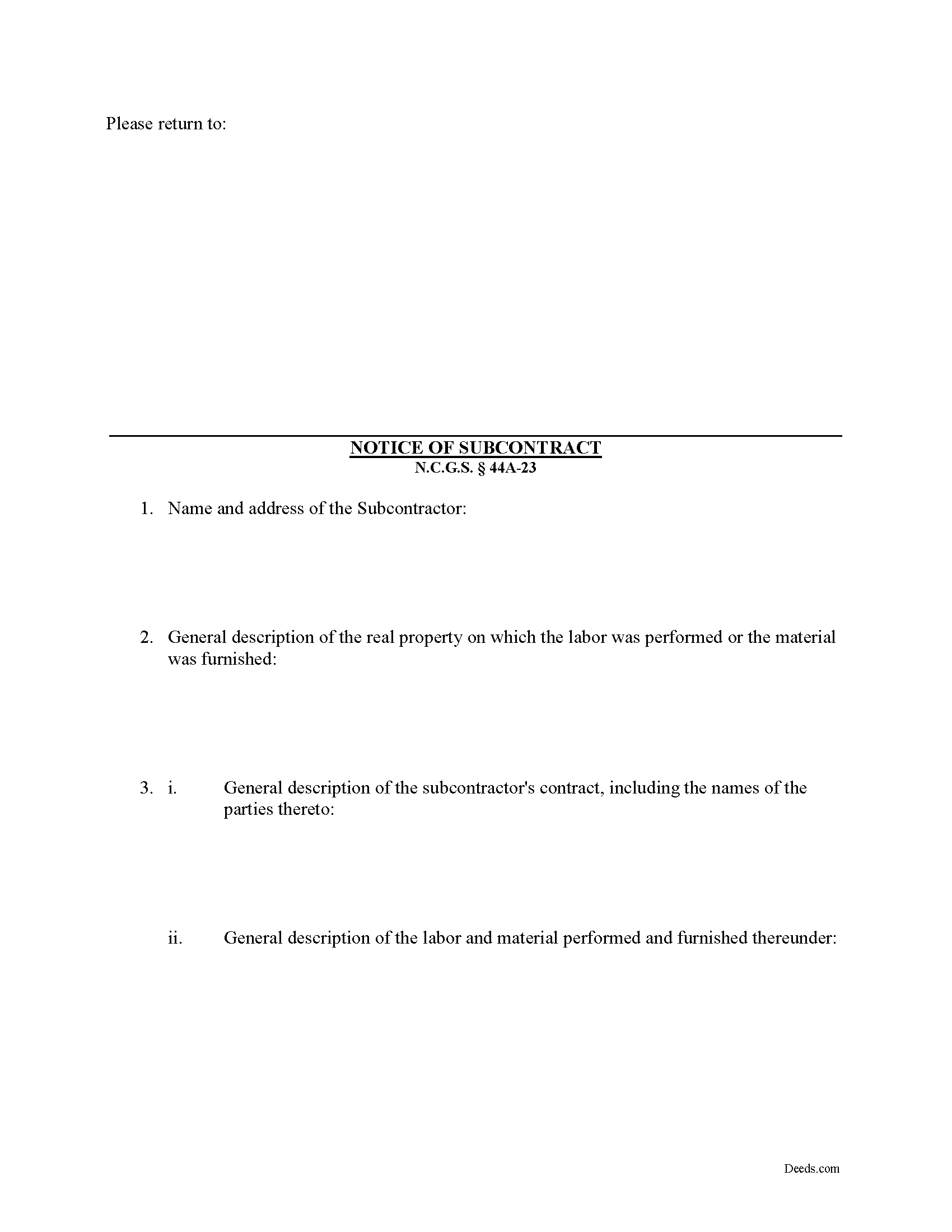
After a Notice of Contract has been filed and posted, second or third tier subcontractors may preserve their lien rights by serving a completed and signed Notice of Subcontract form on the contractor by certified mail or personal service. If the Notice is not filed and served, that second or third tier subcontractor will be barred from filing a claim of lien against the owner's real property. N.C.G.S. 44A-23.
The Notice of Subcontract contains: (1) the name and address of the subcontractor; (2) a general description of the real property on which the labor was performed or the material was furnished (such as street address, tax map lot and block number, reference to recorded instrument, or any description that reasonably identifies the real property); (3) a general description of the subcontractor's contract, including the names of the parties; and (4) a general description of the labor and material performed and furnished. N.C.G.S. 44A-23(b)(3).
Filing the Notice of Subcontract requires the contractor to send notice to second and third tier subcontractors within five days of paying a subcontractor on the project. Id. The purpose of this notification is to provide notice tha... More Information about the North Carolina Notice of Subcontract
Claim of Mechanics Lien
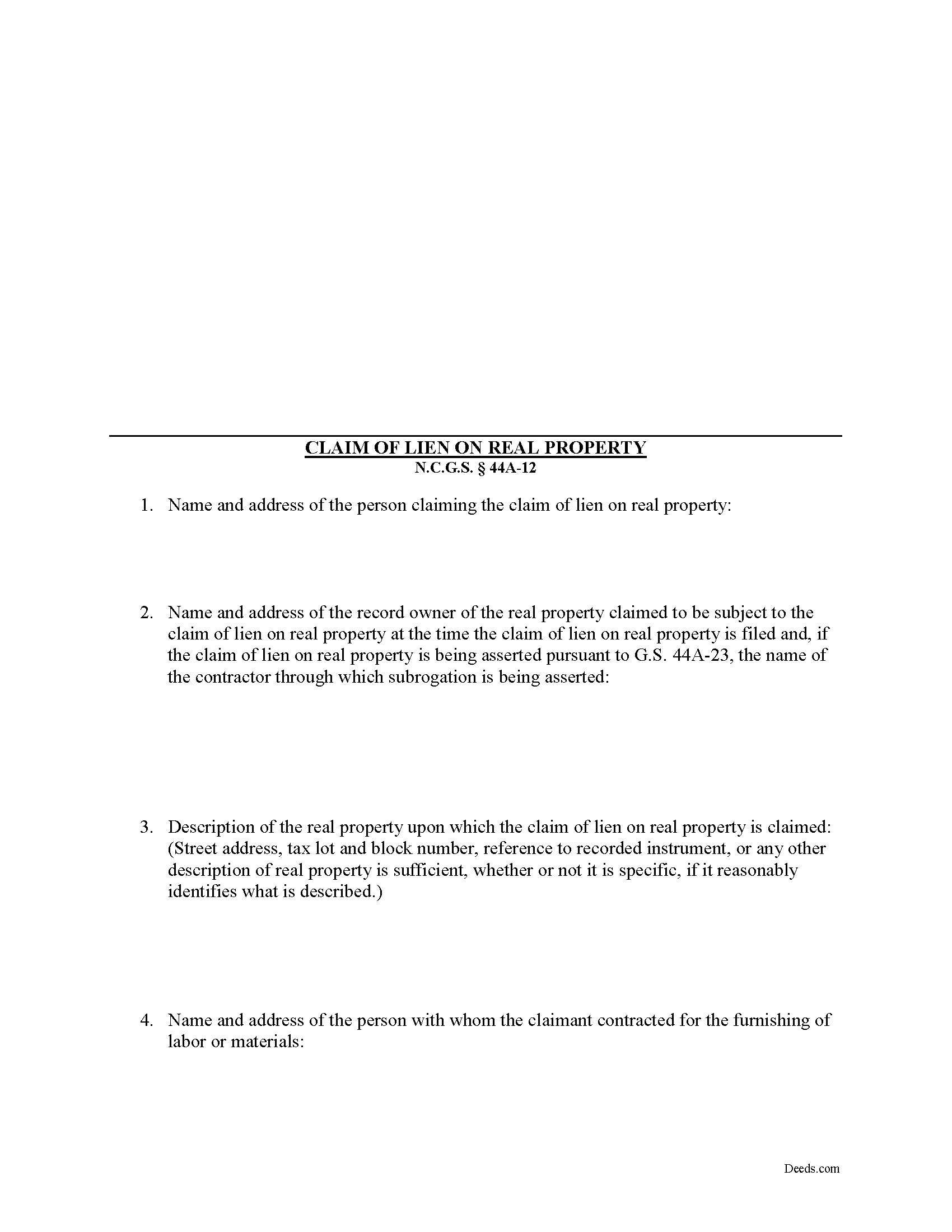
Filing a Mechanic's Lien in North Carolina
Mechanic's liens are used to enforce the terms of payment in a contract when the amount that's owed remains unpaid by the property owner or other contractors in the chain. The lien operates by putting a "block" on the owner's title so that he or she will find it difficult to sell or refinance the property without first resolving the lien. In turn, the lienholder has the power to foreclose, or force a sale on the property to recover money owed. In North Carolina, potential claimants can obtain a mechanic's lien by filing a Claim of Lien on Real Property in accordance with the statutory requirements.
Claims of lien on real property may be filed at any time after the obligation matures, but no later than 120 days after the final furnishing of labor or materials at the site of the improvement by the person claiming the lien. N.C.G.S. 44A-12(b).
Unlike in many states where lien claims are recorded in a land records office, all claims of lien on real property must be filed in the office of the clerk of superior court in each county where the real property subject to the claim of lien on real property is located. N.C.G.S. 44A-12(a). Th... More Information about the North Carolina Claim of Mechanics Lien
Claim of Lien Against Construction Funds
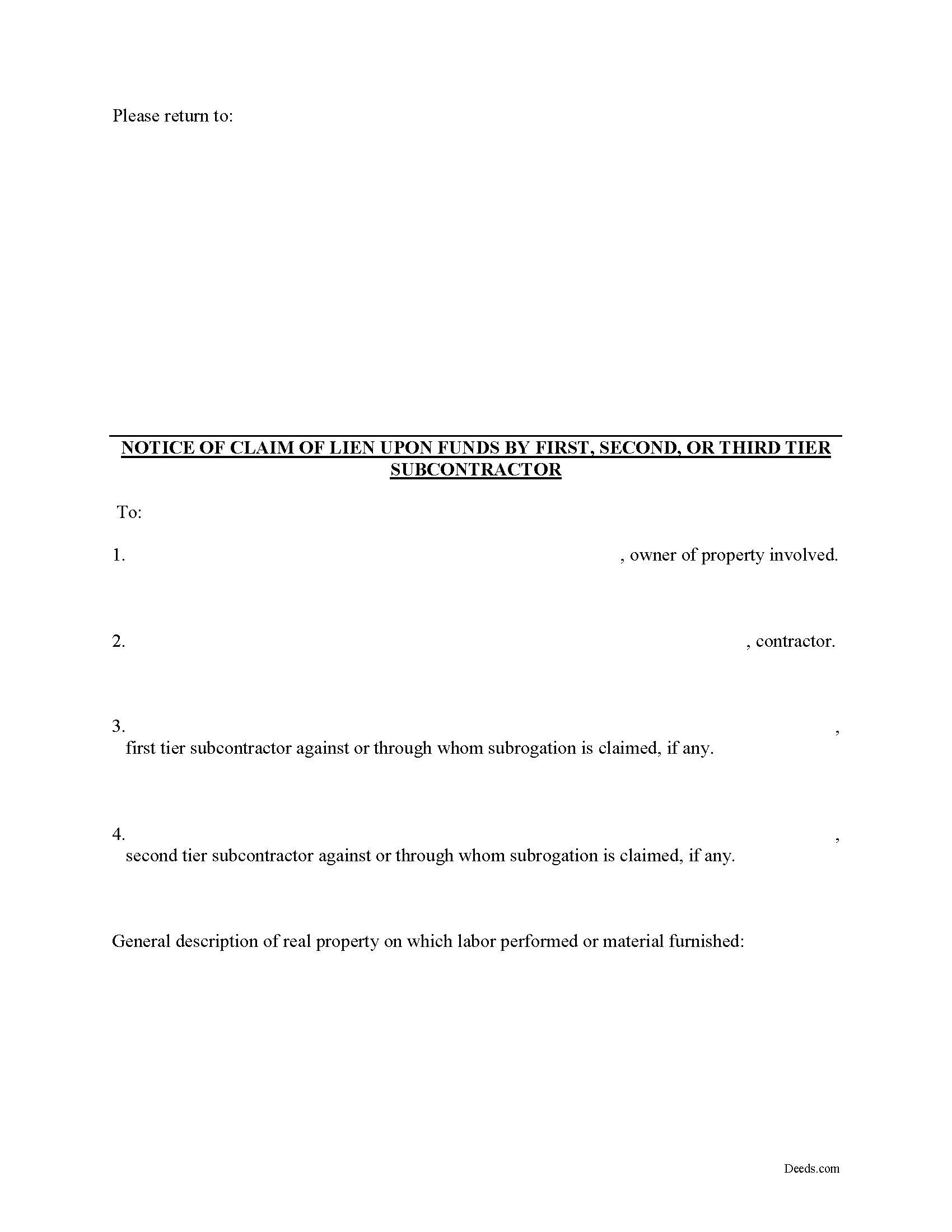
Claiming a Lien Against Construction Funds in North Carolina
In addition to claiming a lien against a real property, contractors can also lien on construction funds regardless of tier. Therefore, a subcontractor has lien rights against any funds that are owed to the party that hired the subcontractor. A lien can be claimed to the extent money is owed to the party occupying the position in the chain above the subcontractor. N.C.G.S. 44A-18.
The subcontractor's right to a lien becomes ripe as soon as labor or materials are first furnished on the job and relates back to the date the contractor or supplier first furnished labor, services, or materials on the project.
The notice of a claim of lien upon funds must set forth all of the following information: (1) the name and address of the person claiming the lien upon funds; (2) a general description of the real property improved; (3) the name and address of the person with whom the lien claimant contracted to improve real property; (4) the name and address of each person against or through whom subrogation rights are claimed; (5) a general description of the contract and the person against whose interest the lien upon funds i... More Information about the North Carolina Claim of Lien Against Construction Funds
Conditional Lien Waiver on Progress Payment
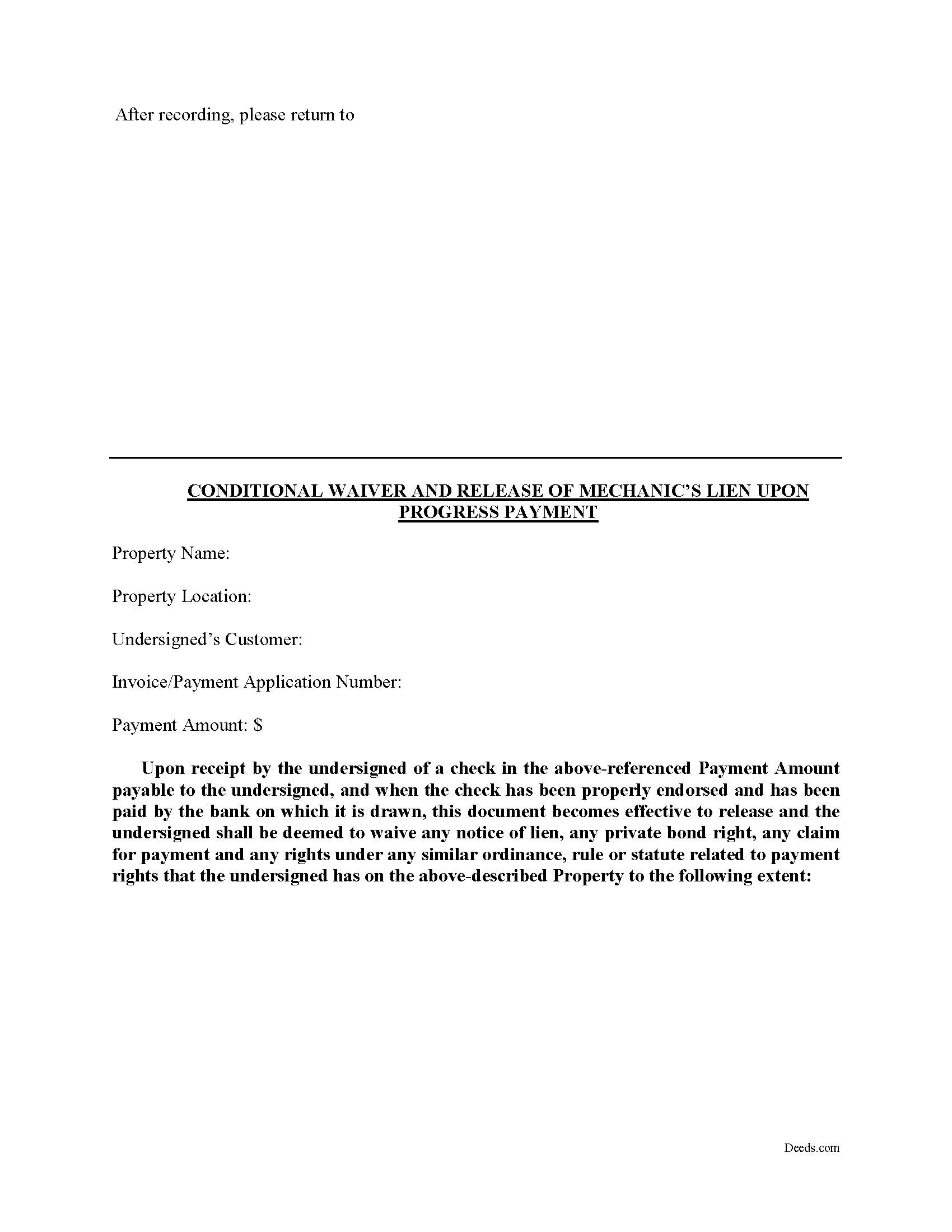
A lien waiver is a document drafted by a potential lien claimant such as a contractor, subcontractor, materials provider, equipment lessor or other party to the construction project (the claimant) that states they have received payment and thereby waive any future lien rights to the owner's property. Simply put, waiving a lien means giving up the right to a future lien in exchange for the payment of the potential lien amount in full or part.
Lien waivers generally fall into two categories: conditional and unconditional. A conditional waiver is effective only upon the triggering of a specific event, such as the payment check clearing. An unconditional waiver is an absolute abandonment of the claimant's right to a future lien whether or not payment is ever made to the possible claimant. North Carolina does not provide for lien waivers by statute, although waivers are still permissible and will be recognized by a state court under the principles of contract law.
The Conditional Waiver upon Progress Payment offers the most protection for lien claimants because it states that if the claimant(s) have actually been paid to date (including no return or stopped payment checks) the ... More Information about the North Carolina Conditional Lien Waiver on Progress Payment
Unconditional Waiver on Progress Payment
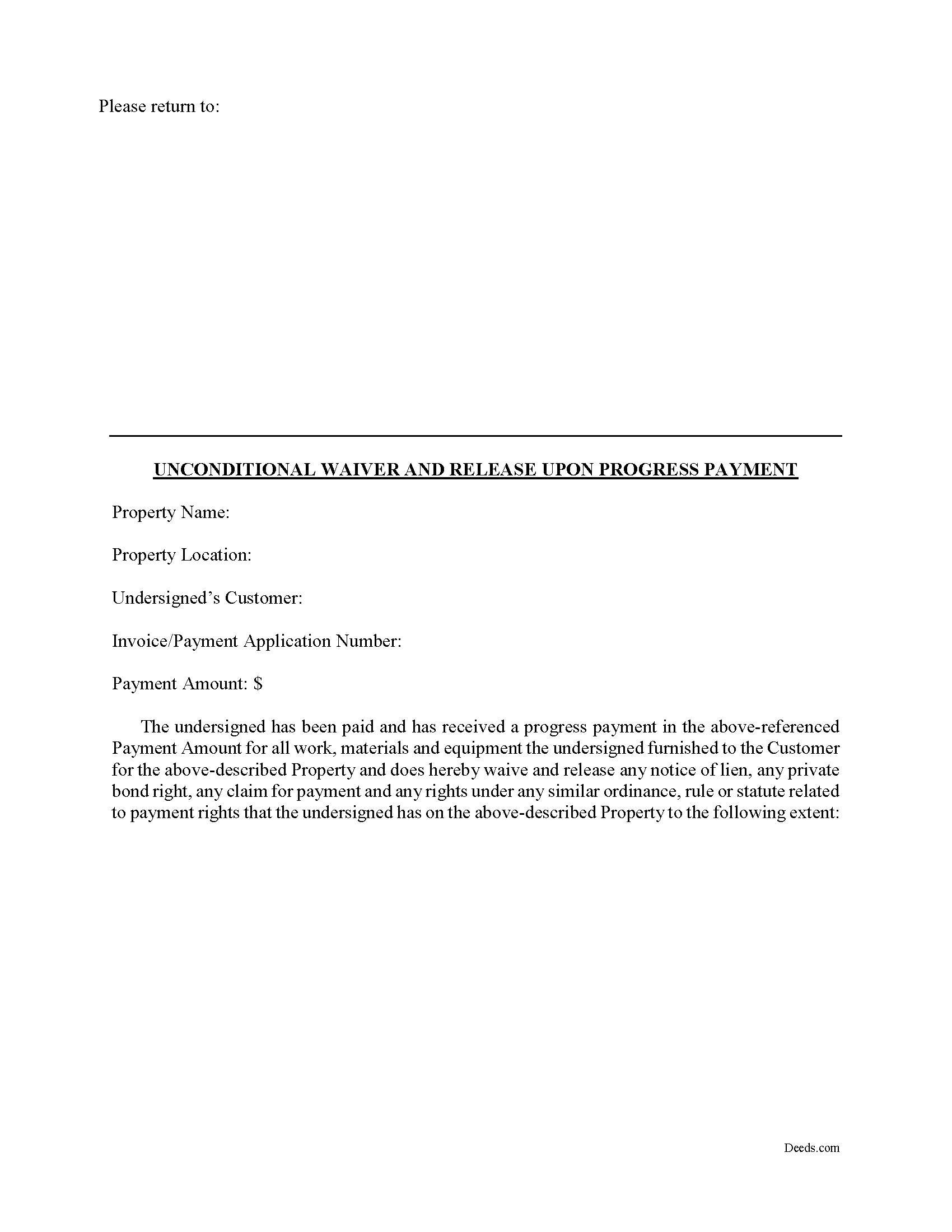
A lien waiver is a document drafted by a potential lien claimant such as a contractor, subcontractor, materials provider, equipment lessor or other party to the construction project (the claimant) that states they have received payment and thereby waive any future lien rights to the owner's property. Simply put, waiving a lien means giving up the right to a future lien in exchange for the payment of the potential lien amount in full or part.
Lien waivers generally fall into two categories: conditional and unconditional. A conditional waiver is effective only upon the triggering of a specific event, such as the payment check clearing. An unconditional waiver is an absolute abandonment of the claimant's right to a future lien whether or not payment is ever made to the possible claimant. North Carolina does not provide for lien waivers by statute, although waivers are still permissible and will be recognized by a state court under the principles of contract law.
An unconditional waiver upon progress payment releases all claimant rights through a specific date unconditionally (meaning that the release of rights is not dependent upon the payment clearing the bank). Because this... More Information about the North Carolina Unconditional Waiver on Progress Payment
Conditional Waiver on Final Payment
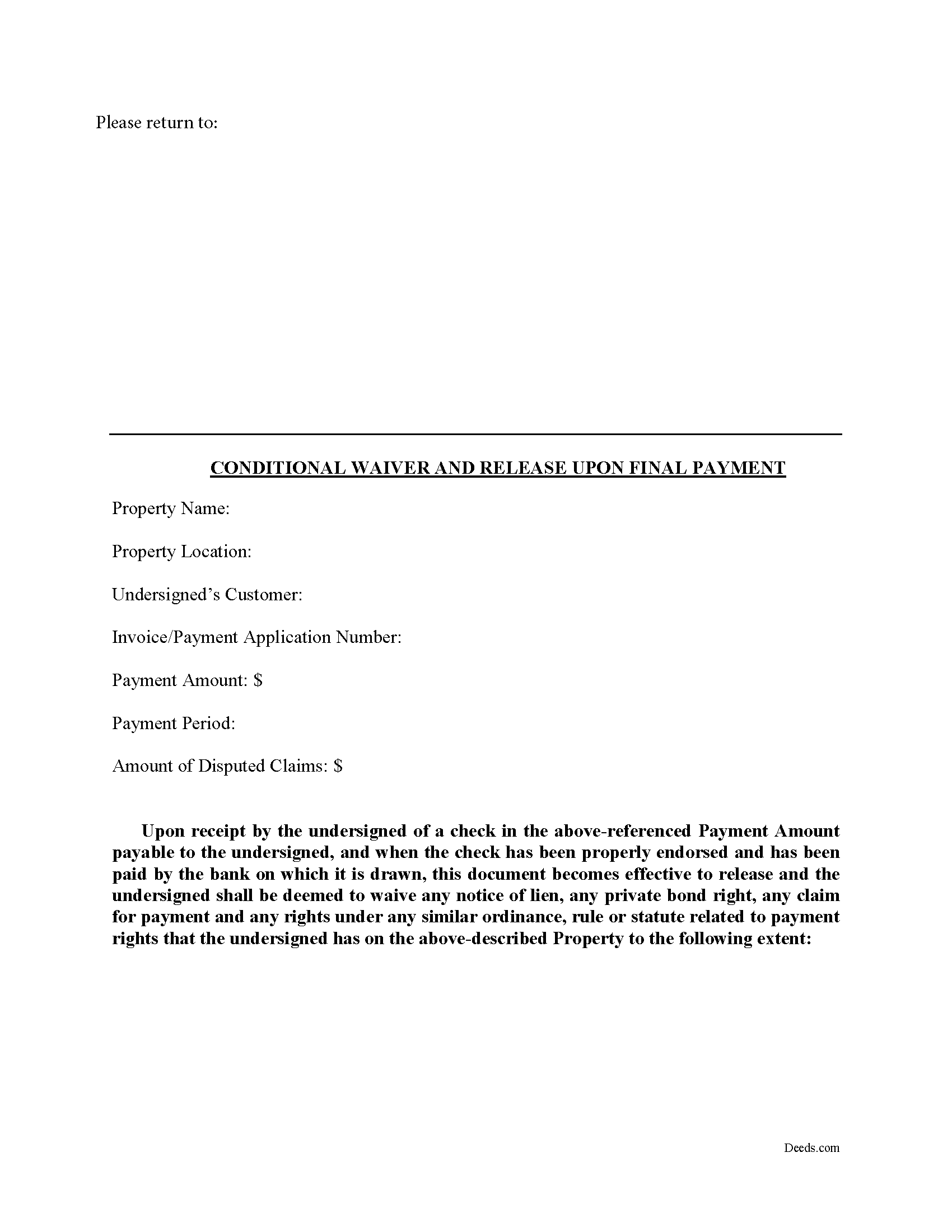
A lien waiver is a document drafted by a potential lien claimant such as a contractor, subcontractor, materials provider, equipment lessor or other party to the construction project (the claimant) that states they have received payment and thereby waive any future lien rights to the owner's property. Simply put, waiving a lien means giving up the right to a future lien in exchange for the payment of the potential lien amount in full or part.
Lien waivers generally fall into two categories: conditional and unconditional. A conditional waiver is effective only upon the triggering of a specific event, such as the payment check clearing. An unconditional waiver is an absolute abandonment of the claimant's right to a future lien whether or not payment is ever made to the possible claimant. North Carolina does not provide for lien waivers by statute, although waivers are still permissible and will be recognized by a state court under the principles of contract law.
A conditional waiver upon final payment releases all claimant rights to file a mechanics lien if they have actually been paid to date (and that includes no return or stopped payment checks). Waivers should identify th... More Information about the North Carolina Conditional Waiver on Final Payment
Unconditional Waiver on Final Payment
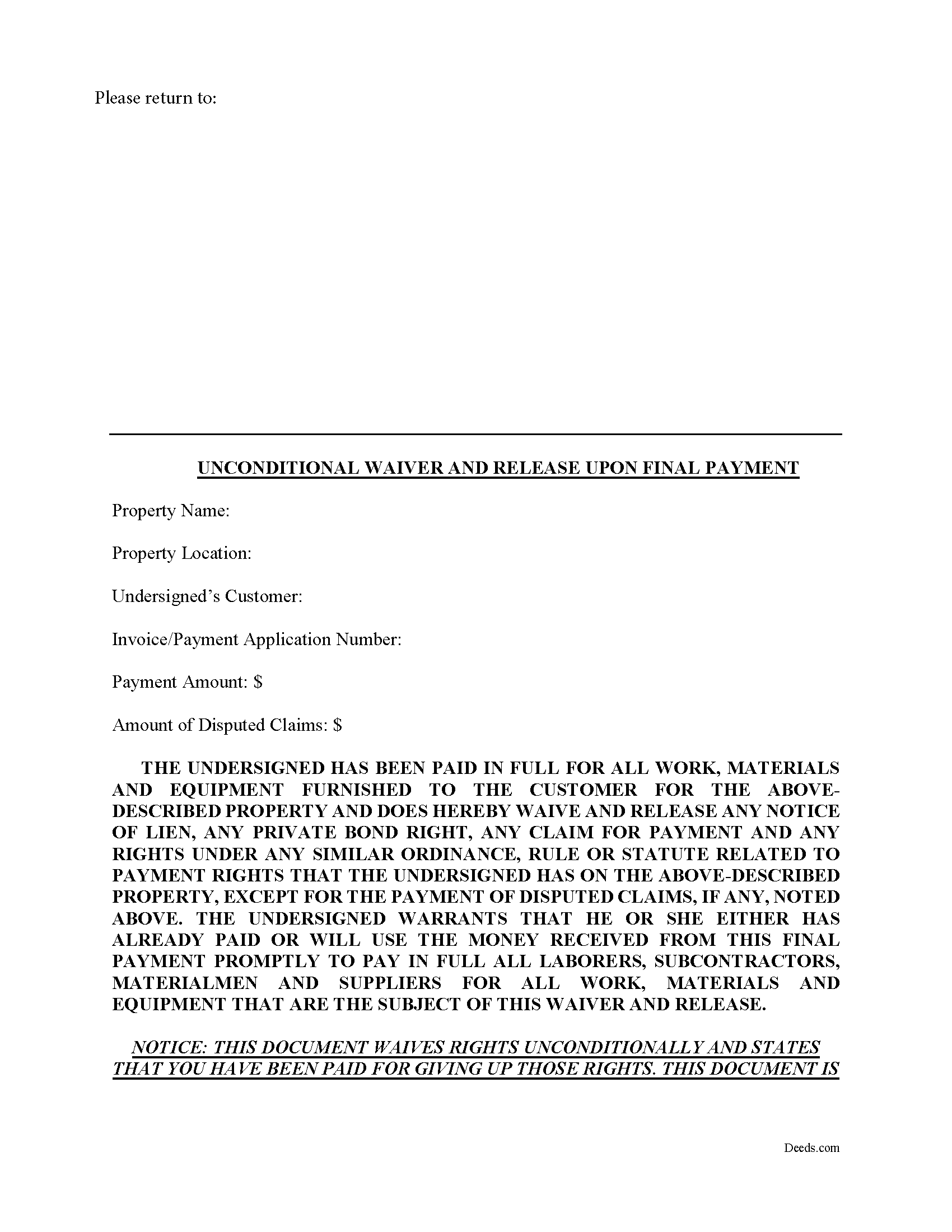
A lien waiver is a document drafted by a potential lien claimant such as a contractor, subcontractor, materials provider, equipment lessor or other party to the construction project (the claimant) that states they have received payment and thereby waive any future lien rights to the owner's property. Simply put, waiving a lien means giving up the right to a future lien in exchange for the payment of the potential lien amount in full or part.
Lien waivers generally fall into two categories: conditional and unconditional. A conditional waiver is effective only upon the triggering of a specific event, such as the payment check clearing. An unconditional waiver is an absolute abandonment of the claimant's right to a future lien whether or not payment is ever made to the possible claimant. North Carolina does not provide for lien waivers by statute, although waivers are still permissible and will be recognized by a state court under the principles of contract law.
An unconditional final waiver upon final payment is the safest waiver for owners because it releases all the claimant's rights to place a mechanics lien on the owner's property, regardless of whether or not the paymen... More Information about the North Carolina Unconditional Waiver on Final Payment
Disclaimer of Interest
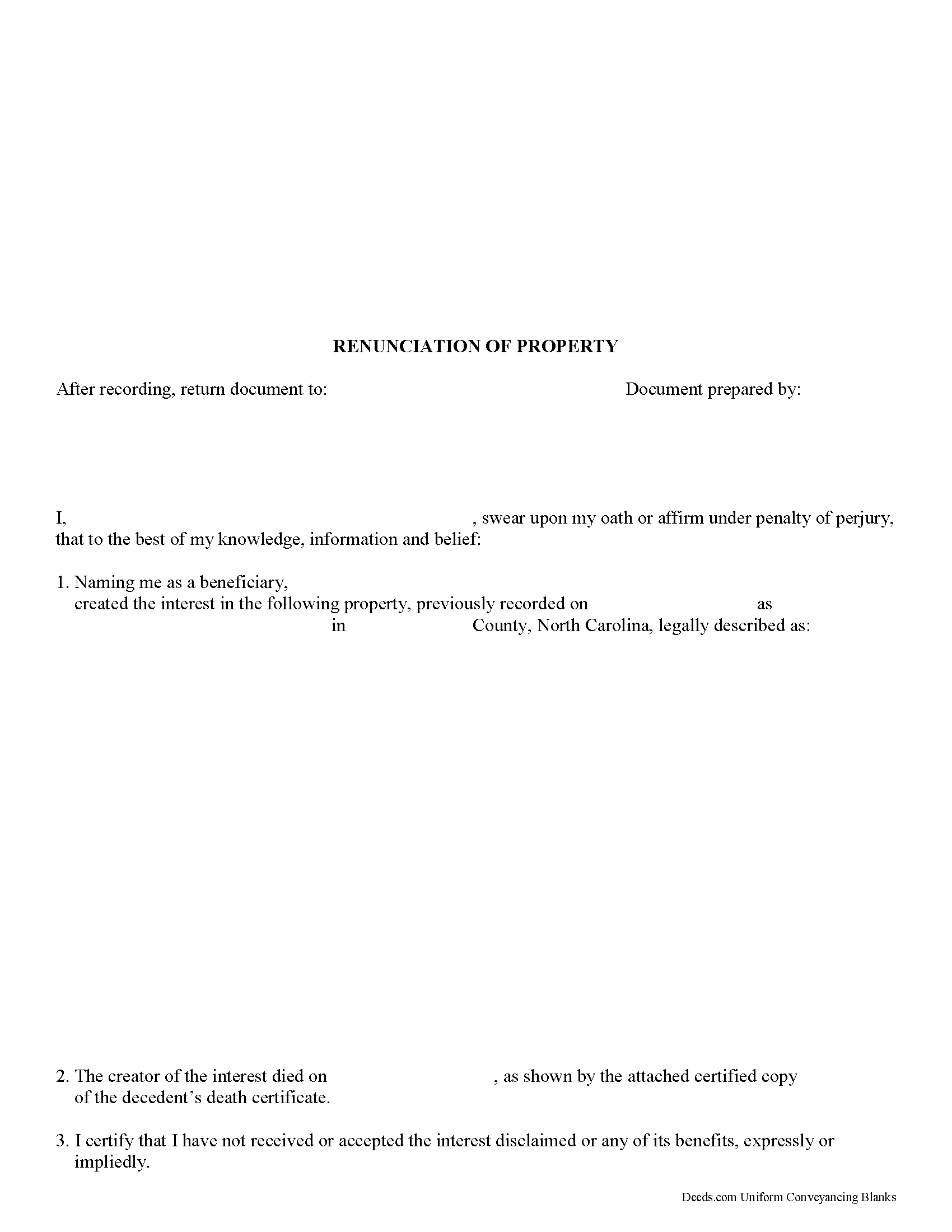
A beneficiary of an interest in property in North Carolina can renounce all or part of a bequeathed interest in, or power over, that property under N.C.G.S. 31.B-1, as long as it has not been accepted through actions that indicate ownership or through a written waiver of the right to disclaim (N.C.G.S. 31.B-4).
The written renunciation should identify the creator of the interest, provide a description of the disclaimed interest, a declaration of the disclaimer and its extent, and it must be signed by the disclaiming party.
A renunciation must be filed within nine months of the transfer (e.g. the death of the creator of the interest) with the clerk of court in the county where proceedings for the administration of the estate have commenced or could commence (N.C.G.S. 31B-2(c)). In the case of real property, record the disclaimer with the register of deeds in the county where the property is located (N.C.G.S. 31B-2(d)). In addition, the renunciation must be delivered to the personal representative of the decedent's estate or the trustee (N.C.G.S. 31B-2.1).
A renunciation is irrevocable and binding for the renouncing party and those claiming under him or her, so be sure to... More Information about the North Carolina Disclaimer of Interest
Contract for Deed
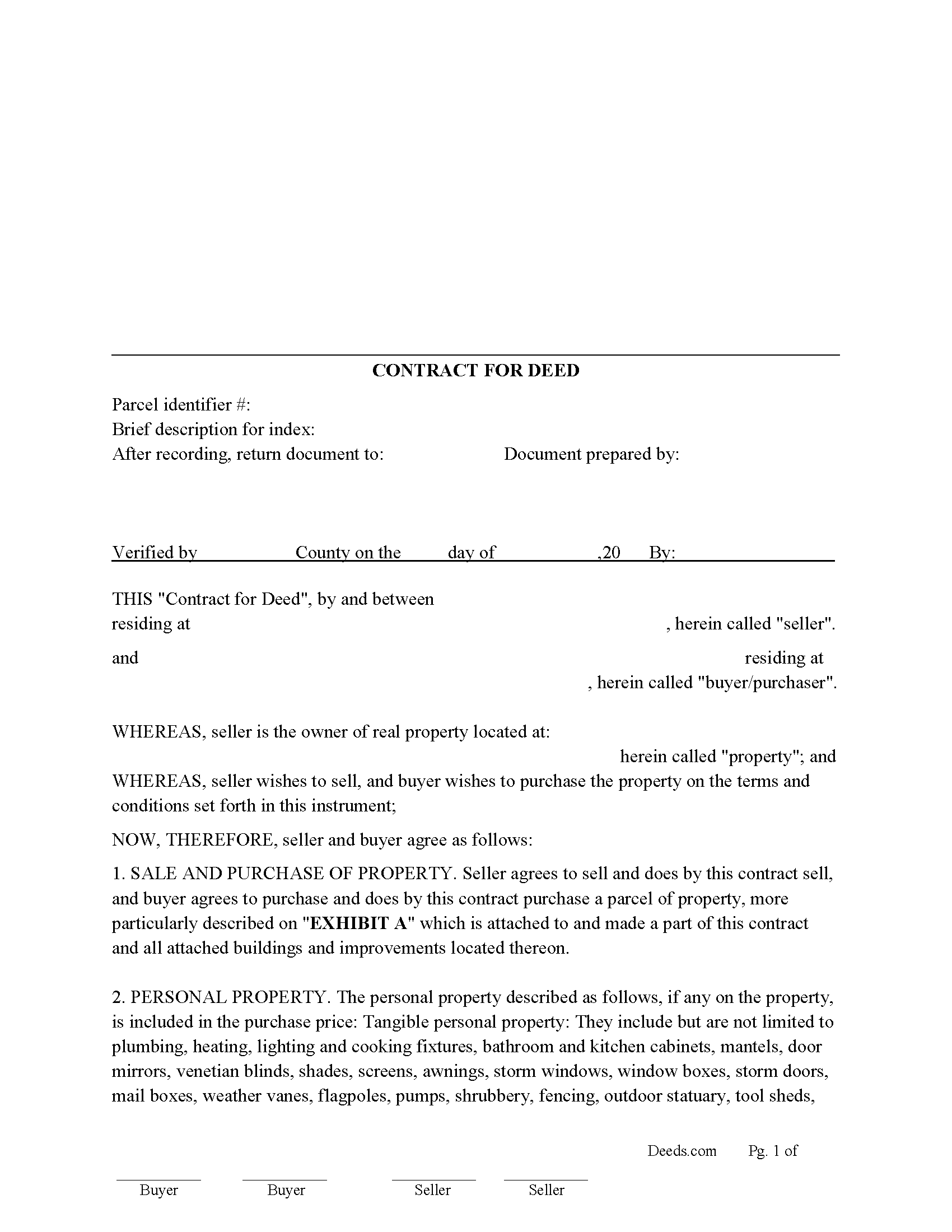
This "Contract for Deed" often called a "Land Contract" is a document (in which the seller agrees to sell an interest in property to the purchaser and the purchaser agrees to pay the purchase price in five or more payments exclusive of the down payment, if any, and the seller retains title to the property as security for the purchaser's obligation under the agreement.) (NC Statute 47H-1(1))
Use this package for Residential Property, Rental Property (up to 4 units), Condominiums, Planned Unit Development Property and Vacant Land. Financing is variable, choose between traditional installment payments or x number of payments followed by a balloon payment. This is common when the seller wants to be cashed out. Interest Rates, late payments and charges are set by seller.
If the purchaser goes into default. They must have the right to cure the default. This "Contract for Deed" form has that clause of "Right to Cure" (See NC Statute 47H-3. Conditions of forfeiture; right to cure.)
In 14 boldface type a "Right to Cancel Statement" must be placed above the purchaser's signature, to the effect of;
NOTE TO PURCHASER: YOU HAVE THE RIGHT TO CANCEL THIS CONTRACT FOR DEED UNTIL MIDNIGHT... More Information about the North Carolina Contract for Deed
Memorandum of a Contract for Deed
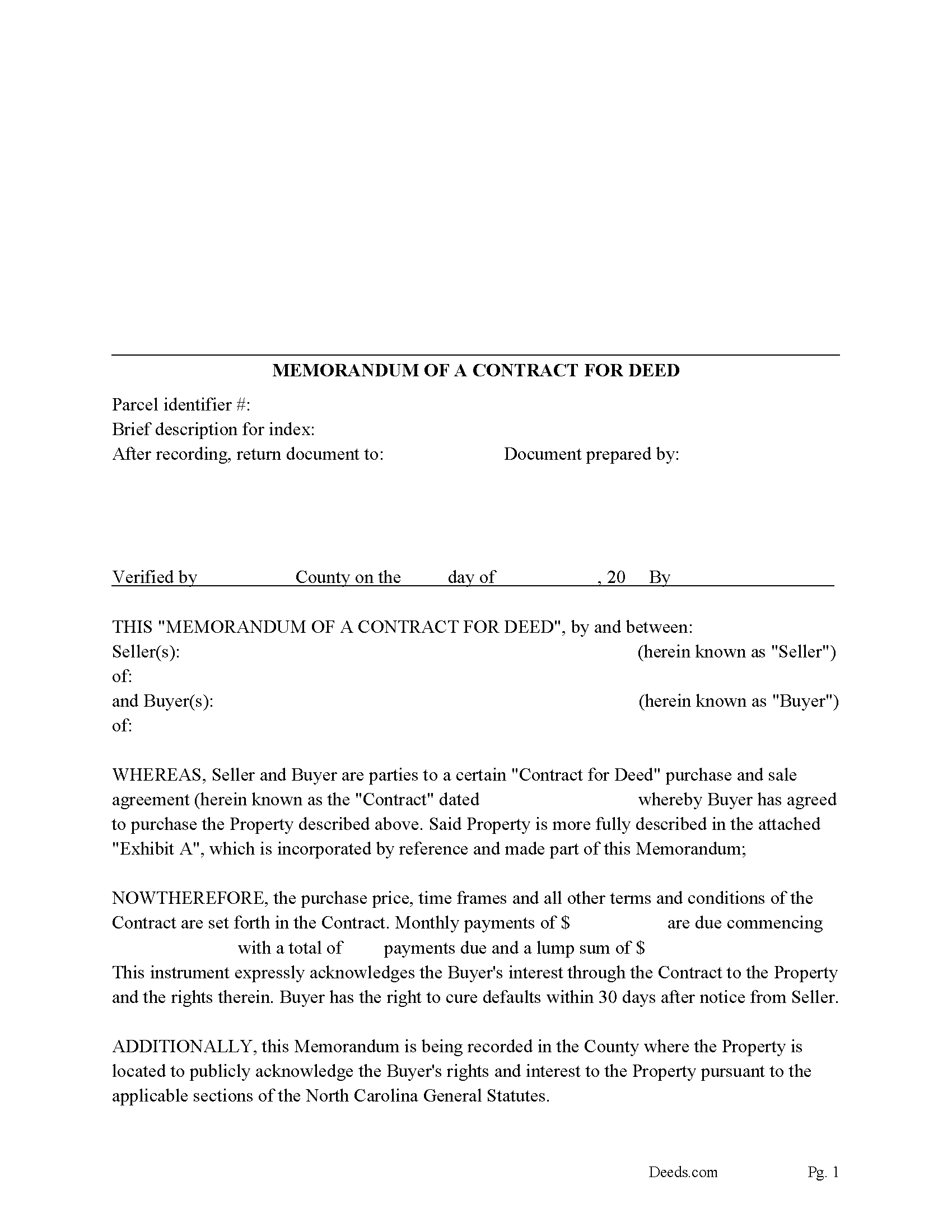
A "Memorandum of Contract for Deed" form can be recorded in place of a "Contract for Deed" This is often used to keep details of a transaction private. This is a 3-page form where the first page has information, second page is a signature page, 3rd page is for the legal description.
A "Contract for Deed" or "Memorandum of a Contract for deed must be recorded (within 5 business days) of execution. It shall (be recorded in the office of the register of deeds in the county in which the property is located.) It shall be titled ("Memorandum of a Contract for Deed") (N.C. Statute 47H-2(d)).
This Memorandum [shall contain, as a minimum, the names of the parties, the signatures of the parties, a description of the property, and applicable time periods as described in subdivisions (b)(8) and (11)] of 47H-2, which states:
(The amount and due date of each installment payment and the total number of installment payments.) (47H-2(b)(8))
(A statement of the rights of the purchaser to cure a default.) (47H-2(b)(11).
[N.C. Statute 47H-2(d)].
This Memorandum notifies the world that the subject property is under contract, this protects both buyers and sellers. Without a recorded contra... More Information about the North Carolina Memorandum of a Contract for Deed
Deed of Trust
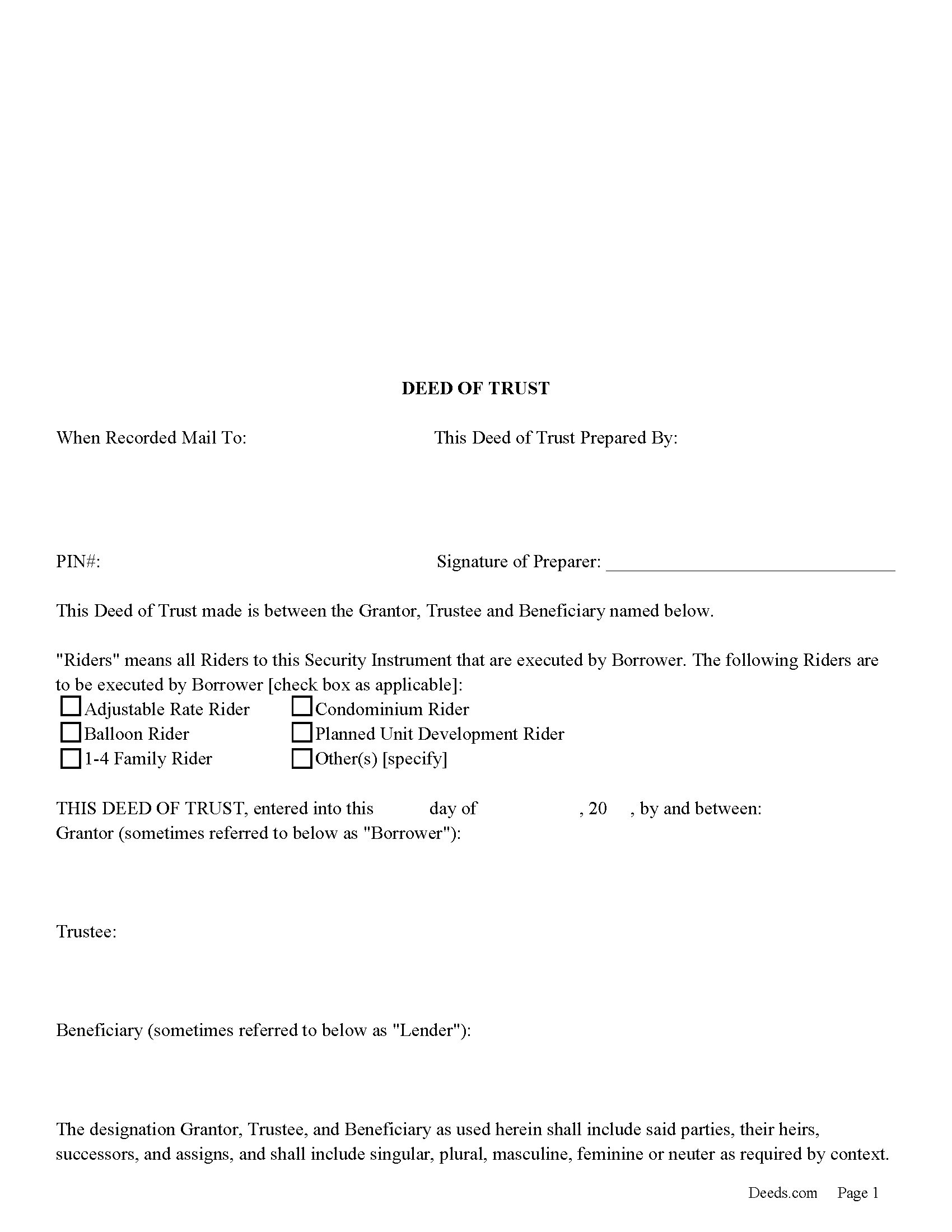
A Deed of Trust is commonly used in North Carolina to secure a loan. Foreclosure can be done non-judicially, saving time and expense. This process is called a Foreclosure by action. The procedure for power of sale foreclosure is contained in Article 2A in Chapter 45 of the North Carolina General Statutes.
There are three parties in this Deed of Trust:
1- The Grantor (Borrower)
2- Beneficiary (Lender) and a
3- Trustee (Neutral Third Party)
Basic Concept. The Trustor (Borrower) conveys property title to a Trustee (Neutral Party). A Trustee or beneficiary/Lender can take an action against any person for damages.
This form can be used by a party selling/financing their own house, rental, condominium or small office building. A Promissory Note and Deed of Trust combined with stringent default terms, can be beneficial to the Lender. The Lender can choose whether the borrower must use the property as their primary residence for the term of the Loan. This can be advantageous for a someone selling a house. Take for example; the borrower moves out and rents the home to someone who diminishes its value or in the case of a small commercial space the Lender wouldn't want the borrower ... More Information about the North Carolina Deed of Trust
Assignment of Deed of Trust
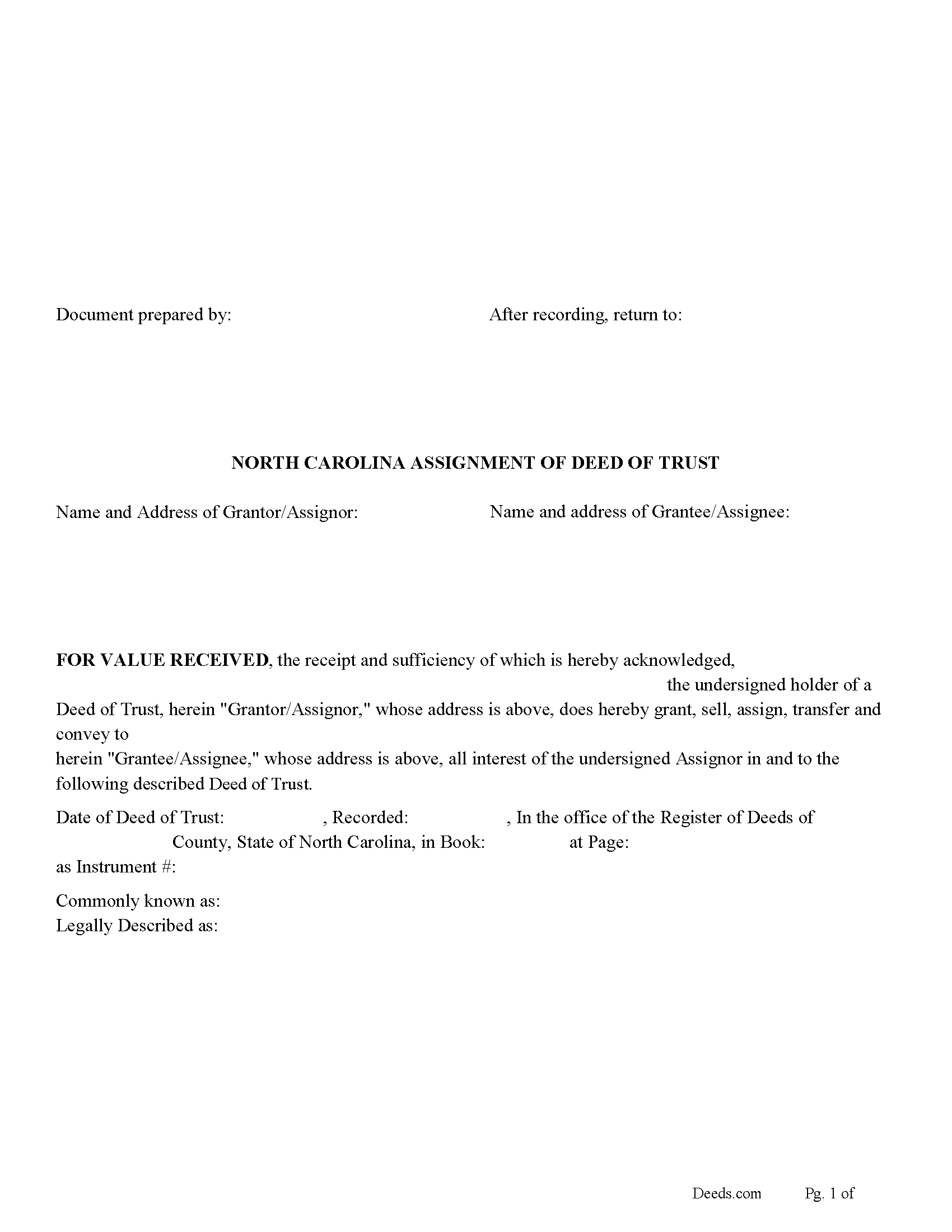
This form is used by a beneficiary/lender who can be a corporation or individual to assign deed of trust and promissory note to another entity/corporation or individual. This is commonly done when a deed of trust has been sold. (The assignee of the note shall have the right to enforce all obligations contained in the promissory note or other agreement, and all the rights of the assignor in the deed of trust, mortgage, or other security instrument, including the right to substitute the trustee named in any deed of trust, and to exercise any power of sale contained in the instrument without restriction.) (47-17.2)
Current Borrowers must be notified of the assignment. Notification consists of contact information of the new creditor, recording dates, recording instrument numbers, changes in loan, etc. Included are "Notice of Assignment of Deed of Trust" forms.
The Truth and lending act requires that borrowers be notified when their Deed of Trust debt has been sold, transferred, or assigned to a new creditor. Generally, within 30 days to avoid up to $2,000.00 in statutory damages, plus reasonable attorney's fees. Systematic violations can reach up $500,000.00.
(North Carolina A... More Information about the North Carolina Assignment of Deed of Trust
Release Deed for Deed of Trust
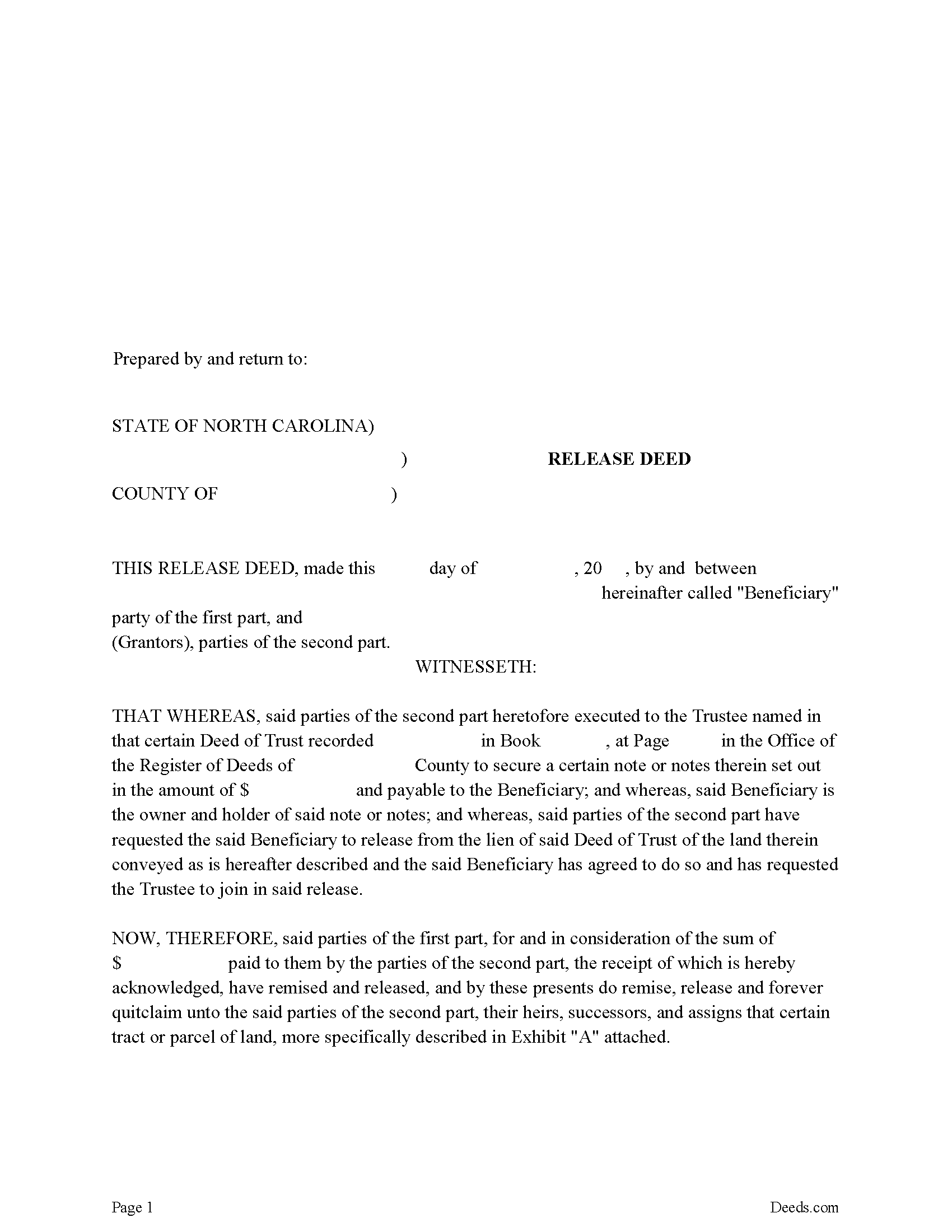
Executed by the lender, once the trustee is notified by the borrower. Signed by the lender, releasing any lien attached by the "Deed of Trust" that's assigned to the property. In general, a release is required to be recorded within 60 days of satisfaction.
(North Carolina Release of DOT Package includes form, guidelines, and completed example)... More Information about the North Carolina Release Deed for Deed of Trust
Deed of Partial Release
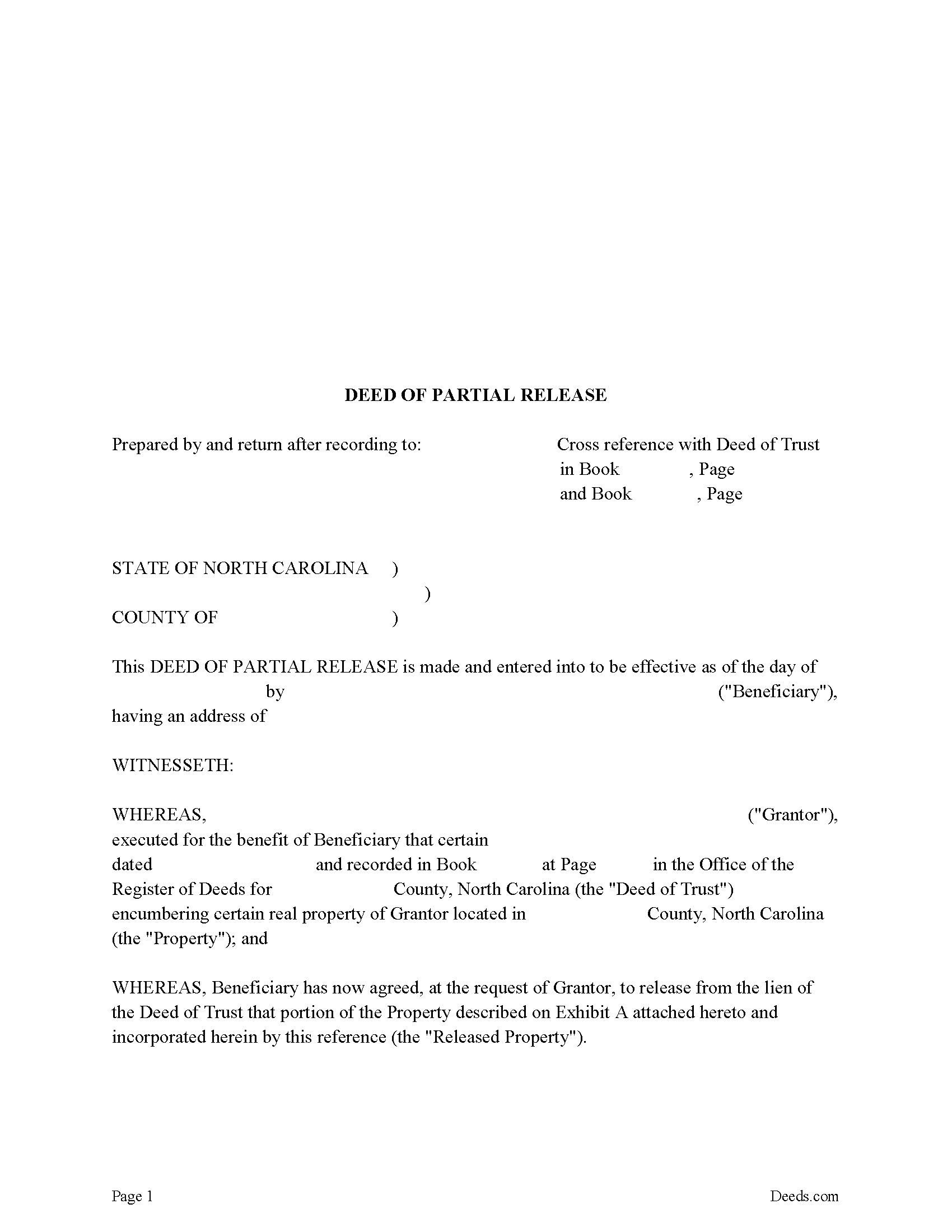
Partial Release documents are guided by North Carolina Statutes 45-36.22
A partial release document for a Deed of Trust must do all the following:
1. State the Deed of Trust it is releasing, original parties to the Deed of Trust, recording data for the Deed of Trust (Book and Page number) and the office in which the Deed of Trust was recorded.
2. That (if the security instrument is a deed of trust, that the person or persons signing the partial release is or are the secured creditor, the trustee, or both the secured creditor and the trustee.) 45-36.22(2)
This Deed of Partial Release is formatted to be used by the secured creditor only, meaning the lender signs the document without the trustee and states:
TO HAVE AND TO HOLD said Released Property, together with all privileges and appurtenances thereunto belonging, to the Owner, its successors and assigns, free and discharged from the lien and operation of the Deed of Trust But it is agreed that this Release shall apply only to Released Property and as to the remainder of the property described in the Deed of Trust (not heretofore released), the Deed of Trust shall remain in full force and effect.
(North Carolina D... More Information about the North Carolina Deed of Partial Release
Appointment of Substitute Trustee
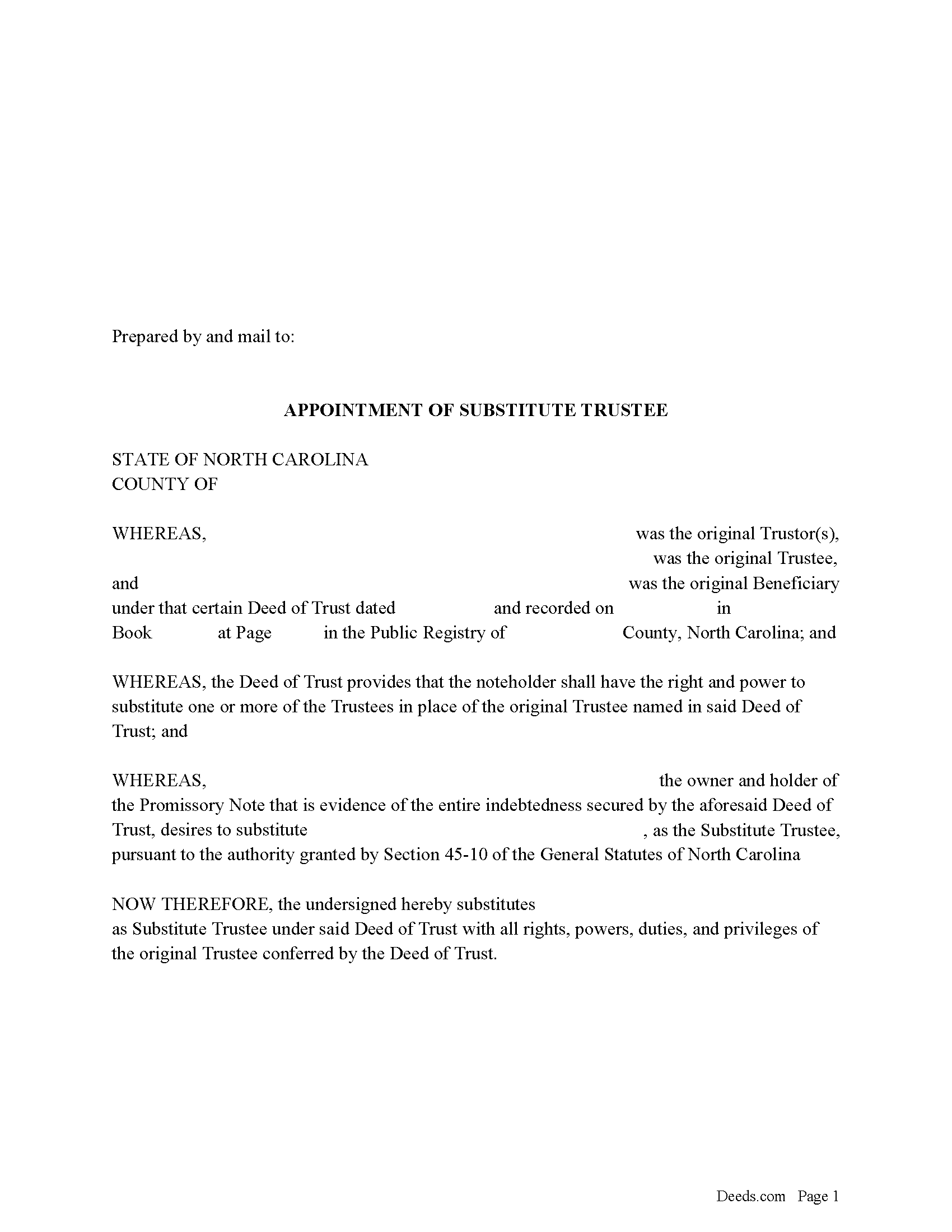
In a Deed of Trust, the trustee is an independent third party who holds conditional title on behalf of the lender for the purpose of either reconveying the property back to the borrower after the loan is repaid or selling the property if the borrower defaults on the loan. Trustee's can be replaced for many reasons, incapacity, incompetency, death, etc. Often a lender will substitute a trustee with a firm or corporation that will be conducting a foreclosure.
NCG 45-10. States:
In addition to the rights and remedies now provided by law, the noteholders may, in their discretion, substitute a trustee whether the trustee then named in the instrument is the original or a substituted trustee or a holder or owner of any or all of the obligations secured thereby, by the execution of a written document properly recorded pursuant to Chapter 47
This form is executed by the beneficiary/lender for the substitution of a trustee, it includes an optional foreclosure clause if needed for that purpose.
(North Carolina AOST Package includes form, guidelines, and completed example)
... More Information about the North Carolina Appointment of Substitute Trustee
Certificate of Trust
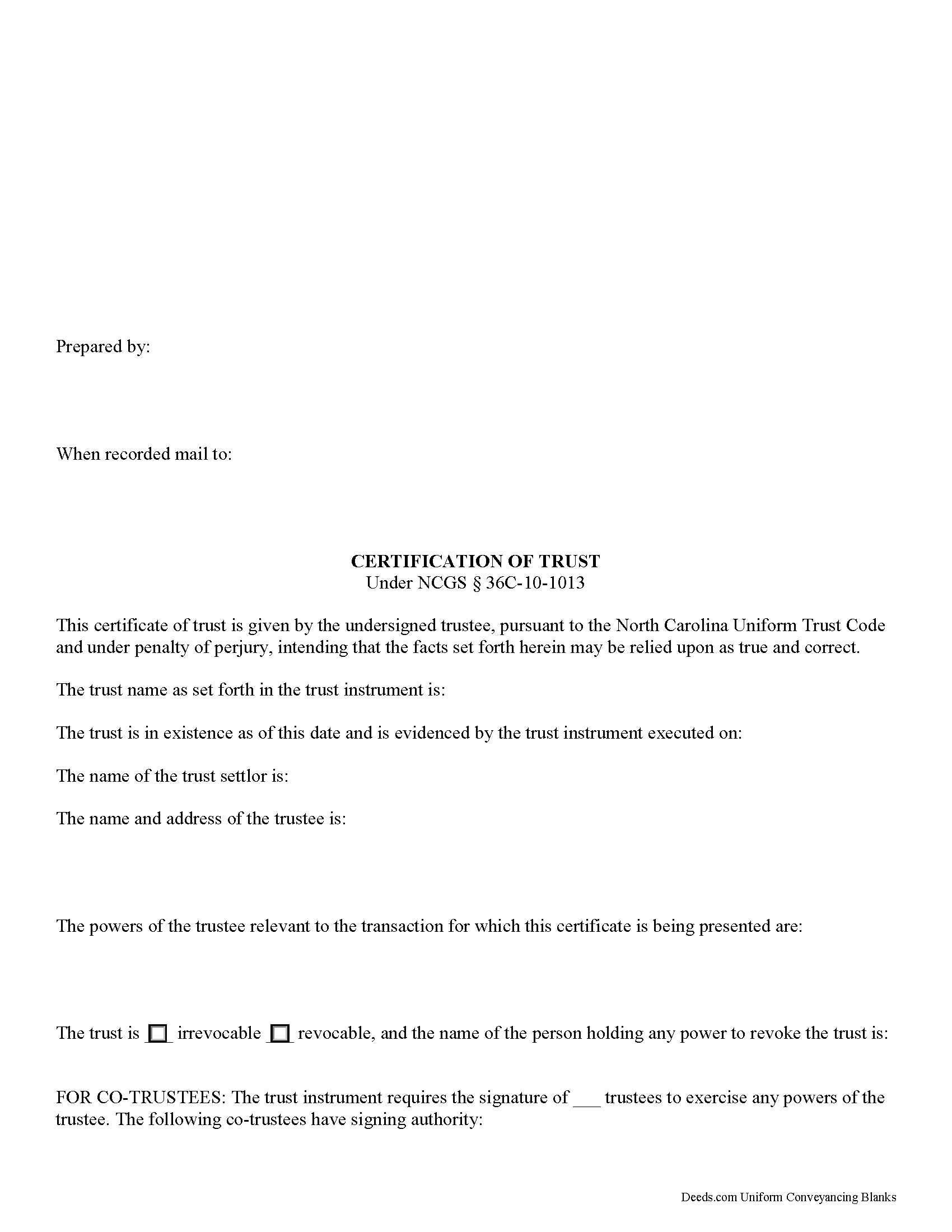
North Carolina Certification of Trust
Codified under the North Carolina Uniform Trust Code, which governs testamentary and non-testamentary trusts, the certification of trust at NCGS 36C-10-1013 is a document verifying a trust's existence and a trustee's authority to act in the transaction for which the certificate is being presented.
A trust is an arrangement whereby a settlor transfers property to another person (the trustee), who holds it for the benefit of a third (the beneficiary). A testamentary trust takes effect upon the settlor's death as specified by his/her will, and a non-testamentary (inter vivos) trust takes effect during the settlor's lifetime, and functions pursuant to the terms established by the settlor in an unrecorded document called the trust instrument.
As the trust's administrator, the trustee handles the trust's assets and sees to the trust's affairs. Upon entering into a transaction involving the trust, a trustee can present a certification of trust to establish his authority to do so. The certificate contains the essential information about the trust that is necessary for the business at hand, allowing the trust instrument (containing the full s... More Information about the North Carolina Certificate of Trust
Notice of Lis Pendens
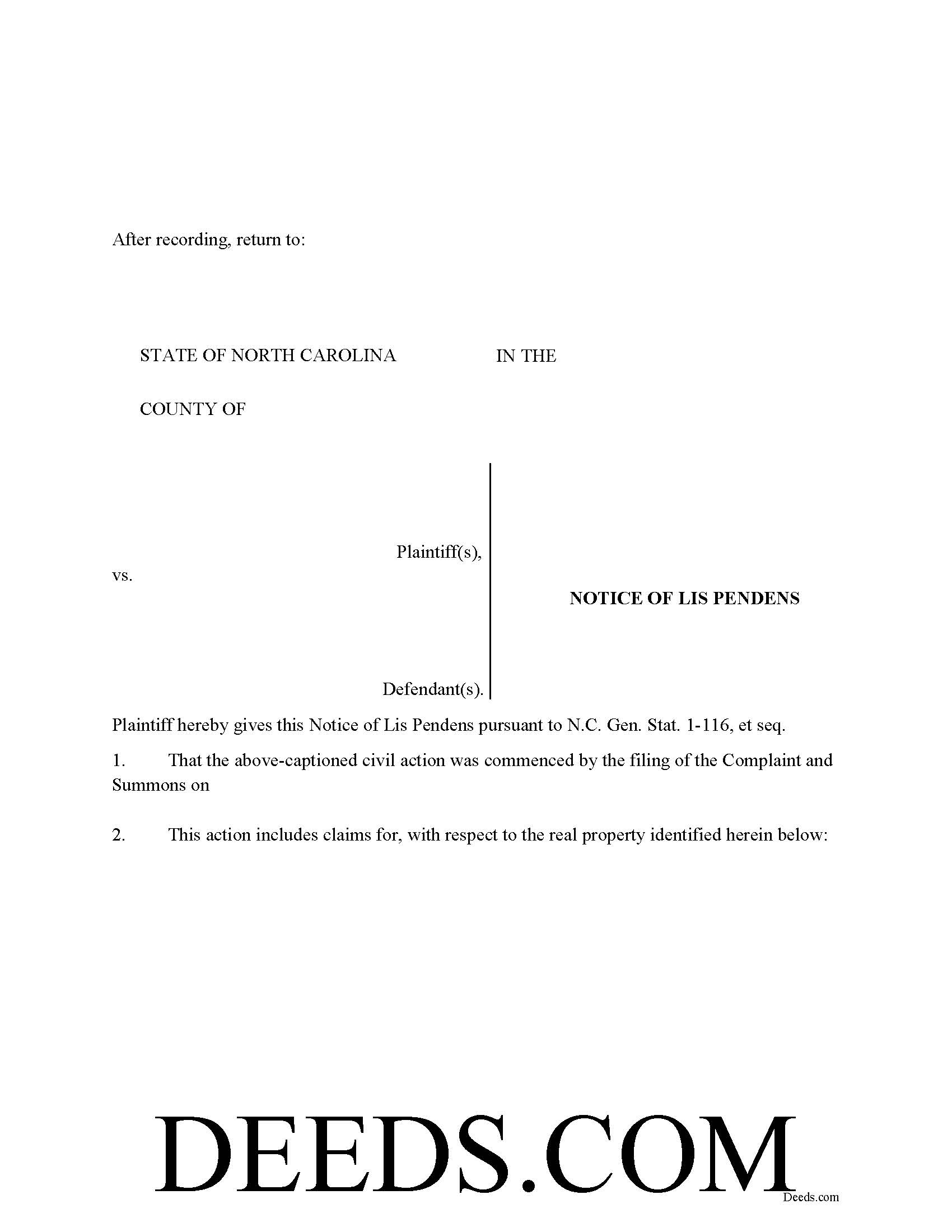
A North Carolina Lis Pendens is (constructive notice of pending litigation.)
Required information:
1. (The name of the court in which the action has been commenced or is pending)
2. (The names of the parties to the action)
3. (The nature and purpose of the action; and)
4. (A description of the property to be affected thereby)
A North Carolina Lis Pendens can be filed:
1. At or any time after a suit is filed
2. (At or any time after the real property has been attached, or)
3. (At or any time after the filing of an answer or other pleading in which the pleading party states an affirmative claim for relief falling within the provisions of subsection (a) of this section.) ( 1-116)
This Lis Pendens Notice has ample space to add multiple plaintiffs and defendants, which is common in litigation.
(North Carolina NOLP Package includes form, guidelines, and completed example)... More Information about the North Carolina Notice of Lis Pendens
Cancellation of Lis Pendens Notice
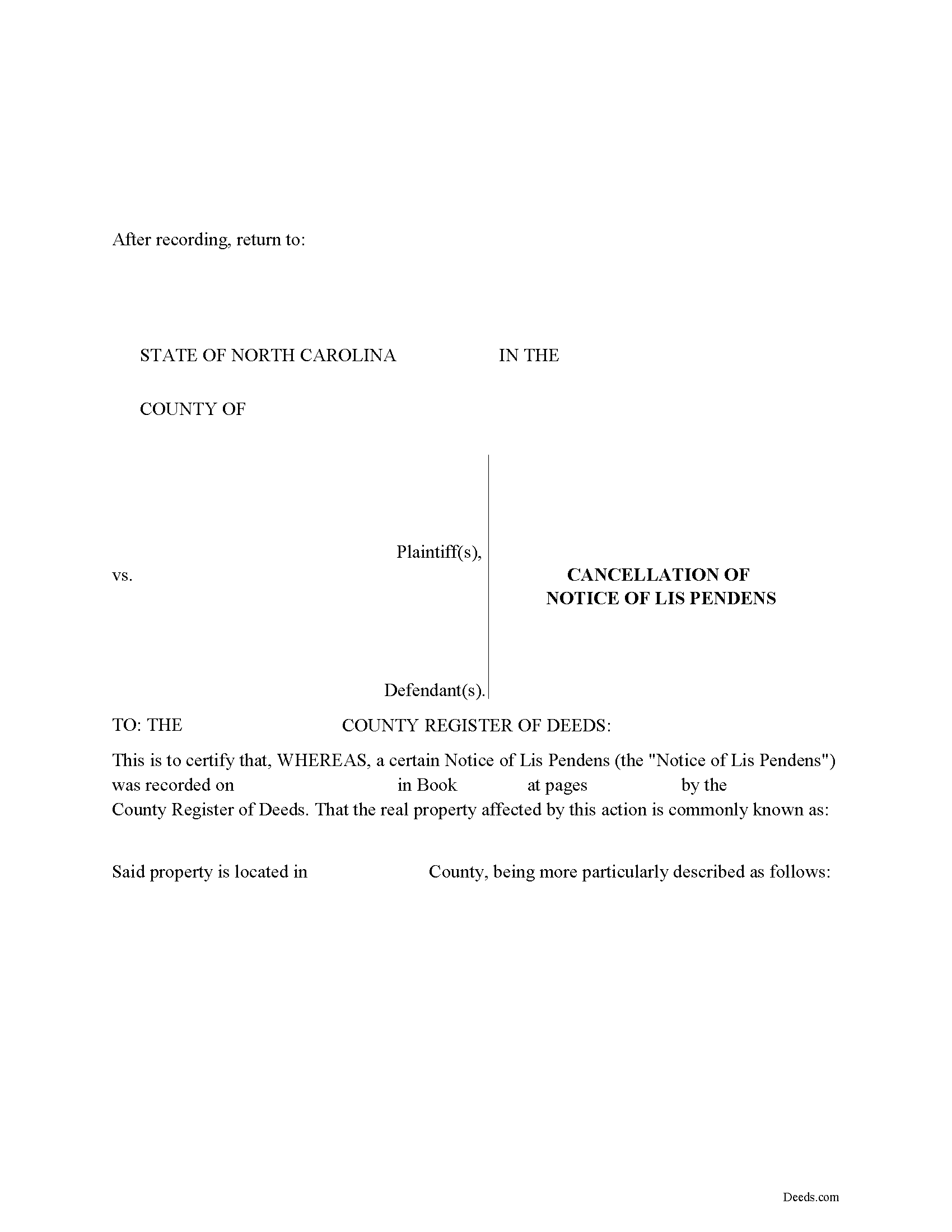
Use this form to cancel a Notice of Lis Pendens that was previously recorded. Cancellation Notice is formatted to meet North Carolina recording requirements, has ample space to enter multiple parties, which is common in cases involving real property.
(North Carolina COLPN Package includes form, guidelines, and completed example)... More Information about the North Carolina Cancellation of Lis Pendens Notice